Похожие презентации:
History of Rock and Roll Introduction
1. History of Rock and Roll Introduction
What is “Rock and Roll” andwho coined the term?
1
2. Rock and Roll History I
Sam Phillips Finds His StarWho was Sam Phillips?
2
3. Sam Phillips (1923-2003)
Sam Phillips was a disc jockey who started theMemphis Recording Service on January 3, 1950.
It later became the Sun Records label.
From 1950-1954 he recorded black R&B artists that
included: Bobby “Blue” Bland, Chester “Howlin’ Wolf”
Burnett, James Cotton, Roscoe Gordon, Riley “B.B.”
King, Little Milton, Herman “Little Junior” Parker, Rufus
“Hound Dog” Thomas.
Was concerned his black artists would not be able to
break through into the “white mainstream” market.
Began searching for a white artist “who could play and
sing in this same exciting, alive way.”
Who would be that artist?
SOURCES: http://en.wikipedia.org/wiki/Sam_Phillips; Shirley, 14.
3
4. Elvis Presley (1935-1977)
Elvis PresleySOURCES: http://en.wikipedia.org/wiki/Elvis_Presley; Shirley, 14-15.
Received his first guitar at
11.
Early influences included:
hymns, gospel, country, and
bluegrass.
In 1947 his family moved to
Memphis and he began
listening to blues and R&B.
In 1950 he began hearing
Sam Phillips’ Sun Studios
recordings.
In 1953 he paid $4 to
record “My Happiness” and
“That’s When Your
Heartaches Begin” at Sun
4
Studios.
5. Elvis’ Break
Elvis at the MississippiAlabama State Fair in 1956.During a break in a 1954 recording
session with guitarist Scotty Moore
and bassist Bill Black, Elvis began
singing an Arthur Crudup blues
song, “That’s All Right.”
It was released 2 weeks later with
“Blue Moon of Kentucky” and
caused a sensation.
Two months later Presley, Moore,
and Black released “Good Rockin’
Tonight” and in less than a year he
became the most popular
entertainer in the mid-south.
In 1955 Colonel Tom Parker
arranged for RCA to buy out Elvis’
contract for $35,000.
SOURCES: http://en.wikipedia.org/wiki/Elvis_Presley; Shirley, 16-18.
5
6. Elvis conquers the charts
In 1956, Elvis had the #1 country single (“I Forgotto Remember to Forget”), the #1 R&B single
(“Heartbreak Hotel”), and the #1 Pop single (“I
Want You, I Need You, I Love You).
In 1957, he released the following hit singles:
“Hound Dog,” “Don’t Be Cruel,” “Love Me
Tender,” Jailhouse Rock,” “All Shook Up,” and
“Teddy Bear.” He appeared on January 6 on The
Ed Sullivan Show from the waist up.
Drafted by the U.S. Army in 1958.
SOURCES: http://en.wikipedia.org/wiki/Elvis_Presley; Shirley, 18-19.
6
7. Elvis conquers Hollywood
SOURCES: http://en.wikipedia.org/wiki/Elvis_Presley; Shirley, 19-20.Graphic: http://en.wikipedia.org/wiki/Jailhouse_Rock_%28movie%29.
Love Me Tender
(1956), Loving You,
Jailhouse Rock
(1957), King Creole
(1958), Flaming Star
(1960), Blue Hawaii
(1961), Viva Las
Vegas (1964) are
among the 31
motion pictures he
made.
7
8. The “Comeback Special” (1968)
Elvis did a one hour prime time TVspecial on NBC in December of 1968 in
which he went back to his rock and roll
roots in an attempt to revive his career.
In 1969 a song introduced during the
Special, “Suspicious Minds,” hit #1 on
the pop charts.
Elvis during the
Comeback Special.
SOURCES: http://en.wikipedia.org/wiki/Elvis_Presley; Shirley, 20-21.
8
9. Elvis, the 70s and Vegas
From 1969 to 1977 Elvis performedover 1000 sold-out shows in Las
Vegas and on tour.
Many believe the January 1973
“Aloha from Hawaii” concert, the
first to be broadcast worldwide by
satellite, is the best of his career.
Elvis Presley died on August 16,
1977. He had been addicted to
prescription drugs and also had a
history of a weak heart and
kidneys. He was 42.
The 70s Elvis
SOURCES: http://en.wikipedia.org/wiki/Elvis_Presley; Shirley, 21.
9
10. Musical Milestones
During his lifetime, Elvis Presley:recorded 104 singles that hit the Top 40 of
the Billboard pop chart.
had 18 #1 Billboard hits, including four
singles in 1956 that occupied the top of
the charts for a cumulative total of 25
weeks. The total (18) is surpassed only by
The Beatles, who had 20 #1 hits. His
closest competitor is Mariah Carey with a
total of 16 #1 hits.
has spent a total of 79 Weeks at the #1
position. His closest competitor is Mariah
Carey with 73 weeks.
had 38 Top 10 Billboard hits. This total is
currently unchallenged; the closest
competitor, Madonna, has 35. The Beatles
had 34 Top 10 hits during their career.
Other records set by Elvis Presley:
From 3/1956 to 11/1959, there was at
least one Elvis song on the singles chart.
From 1956 to 1962, he had 24 top 5 hit
singles in a row, each of which sold in
excess of one million copies. The closest
anyone has come to this was Madonna in
the late 1980s and early 1990s, with 19
consecutive top 5 hits.
On the official UK Top 40 chart, "It's Now
Or Never" reached #1 in the week of
January 30, 2005, 27 years after
Presley's death.
Elvis Presley has 116.5 million albums
and approximately 50 million singles
certified by RIAA in the United States,
making his total US record sales
aproximately 167 million.
SOURCES: http://en.wikipedia.org/wiki/Elvis_Presley.
10
11. Quotes about Elvis
Elvis was the only man from Northeast Mississippi who could shake his hips andstill be loved by rednecks, cops, and hippies. -- Jimmy Buffett.
When I first heard Elvis' voice, I just knew that I wasn't going to work for anybody,
and nobody was going to be my boss. He is the deity supreme of rock and roll
religion as it exists in today's form. Hearing him for the first time was like busting
out of jail. I thank God for Elvis Presley... Elvis recorded a song of mine, that's
the one recording I treasure the most. -- Bob Dylan.
Don't blame it on Elvis, for shakin' his pelvis, Shakin' the pelvis been in style way
back since the River Nile. -- The Fabulous McClevertys, calypso singers, 1957.
Before Elvis, there was nothing. -- John Lennon.
Before Elvis, everything was in black and white. Then came Elvis. Zoom,
glorious Technicolor. -- Keith Richards.
No one will ever touch Elvis. -- Garth Brooks.
Without Elvis, none of us could have made it. -- Buddy Holly.
That Elvis, man, he is all there is. There ain't no more. Everything starts and
ends with him. He wrote the book. -- Bruce Springsteen
SOURCES: http://en.wikipedia.org/wiki/Elvis_Presley.
11
12. Rock and Roll History II
Hail, Hail, Rock and Roll12
13. Major label recording practices in the early 1950s
Rerecord minor hits released by smallcompanies.
Turn them into smash hits by making them less
daring and gearing them towards white middle
America.
Example: Fats Domino’s “Ain’t that a Shame”
was covered by Pat Boone.
13
14. Goal of small record labels
Find artists “so talented and unique—orso outrageous—that their styles could
not be easily imitated by other artists on
the major labels.”
Who are 3 artists that fall into this
category?
14
15. Answer
“Little Richard” PennimanJerry Lee Lewis
Chuck Berry
15
16. Little Richard (1932- )
Little RichardBorn Richard Wayne Penniman.
Producer Bumps Blackwell was
looking for a “new Ray Charles”
for Specialty Records.
On September 13, 1955 Richard
recorded “Tutti Frutti.”
The lyrics were changed from
“Tutti-frutti loose booty” to “Tutti
frutti all rooty” because Blackwell
felt they were over the line. (Tuttifrutti was a slang term meaning a
“gay male.”)
SOURCES: http://en.wikipedia.org/wiki/Little_Richard;
Shirley, 24-25.
16
17. Richard’s hits 1956-57
Little Richard in a 1957 performance“Long Tall Sally” / “Slippin’ and Slidin”
“She’s Got It,” Heeby-Jeebies,” “Lucille,” and
“Jenny-Jenny.”
“His frantic performing style can be seen in
such period films as Don't Knock the Rock
(1956) and The Girl Can't Help It (1956), for
which he sang the title song, written by Bobby
Troup.”
In October 1957 he left show business to
enroll at a Pentecostal Bible college.
His vocal style would influence Paul
McCartney, Mick Jagger, and John Fogerty
(Creedence Clearwater Revival).
SOURCES: http://en.wikipedia.org/wiki/Little_Richard;
Shirley, 27-29.
17
18. More Little Richard
In 1959 he returned to the music business, butwas never as popular as he had been earlier.
In 1962, he toured the UK supported by The
Beatles and The Rolling Stones who were big
fans.
In 1986 was one of the first inductees into the
new Rock and Roll Hall of Fame. He also
appeared in the movie, Down and Out in Beverly
Hills, scoring a hit with “Great Gosh-a-Mighty.”
In 2000 a made-for-TV film, Little Richard, starred
Leon Robinson in the title role.
SOURCES: http://en.wikipedia.org/wiki/Little_Richard.
18
19. Jerry Lee Lewis (1935- )
Cousin of Mickey Gilley and Jimmy Swaggart.Joined Carl Perkins, Johnny Cash, Roy
Orbison, and Billy Lee Riley (Rockabilly artist) at
Sam Phillips’ Sun Records in Memphis.
Recorded “Crazy Arms” in 1956.
Recorded “Whole Lotta Shakin’ Goin’ On” in
1957. Went wild kicking out the piano stool on
the Steve Allen Show.
Nicknamed “The Killer” for his outrageous onand-off-stage antics.
Jerry Lee Lewis
SOURCES: Shirley, 30-32. http://en.wikipedia.org/wiki/Jerry_Lee_Lewis
19
20. Lewis’ hits (1957-1958)
“Breathless“ and “Great Balls of Fire.”“Crazy” is an error in the text.
In December 1957 wed his 13 year old
second cousin, Myra Gale Brown, starting a
scandal that hurt his career.
In 1958 appeared in the film, High School
Confidential, performing the title cut standing
on the open deck of a truck.
Jerry Lee at the piano.
SOURCES: Shirley, 32-33;
http://en.wikipedia.org/wiki/Jerry_Lee_Lewis
20
21. More Jerry
Lewis with fan Lisa Marie Presley1n 1986 was inducted into the Rock
and Roll Hall of Fame.
In 1989 was the subject of the film,
Great Balls of Fire, starring Dennis
Quaid based on the book by his exwife Myra.
In February of 2005 he was given a
Lifetime Achievement Award by the
Recording Academy.
He released in September of 2006 a
new CD, “Last Man Standing,” with an
“amazing list of guest artists.”
SOURCE: http://en.wikipedia.org/wiki/Jerry_Lee_Lewis;
http://theband.hiof.no/albums/the_pilgrim.html
21
22. Sidebar: Screamin’ Jay Hawkins
Screamin’ Jay HawkinsJalacy Hawkins (1929-2000).
Known primarily for the song, “I put a spell
on you.”
At the beginning of his shows, he would
emerge from a coffin dressed in a Draculalike cape. Also used leopard fur and red
leather.
Cited Paul Robeson and Enrico Caruso as
influences.
The film, Stranger than Paradise,
repopularized “I put a spell on you” in
1983.
Hawkins also appeared in the film, Mystery
Train, as a hotel night clerk.
SOURCES: Shirley, 34;
http://en.wikipedia.org/wiki/Screamin%27_Jay_Hawkins
22
23. Chuck Berry (1926- )
Born in St. Louis. Influences includedNat King Cole, T. Bone Walker, and
Muddy Waters.
In 1955 Waters discovered him at a
small blues club in Chicago and
introduced him to Leonard and Cliff
Chess of Chess Records who had
recently signed Bo Diddley.
In September ’55 he recorded
“Maybellene,” a remake of the country
hit, “Ida Red (May)” which reached #5
on the pop charts and #1 on the R&B
charts.
The dapper Chuck Berry
SOURCES: Shirley, 35-36;
http://en.wikipedia.org/wiki/Chuck_Berry;
http://www.chuckberry.com/about/biography3.html
23
24. Berry’s hits (1956-58)
“Roll Over, Beethoven,” “School Days,”“Johnny B. Goode,” and “Sweet Little
Sixteen.”
Influenced numerous guitarists
including Jimi Hendrix and Keith
Richards.
Had legal troubles in 1960 and would
never regain his popularity.
Chuck doing the “duck walk.”
SOURCES: Shirley, 38-39;
http://en.wikipedia.org/wiki/Chuck_Berry;
http://www.chuckberry.com/music/charts.html
24
25. More Chuck Berry
Had a #1 hit in 1972 with “My Ding-a-ling.”In 1978 appeared as himself in American Hot Wax, a film bio of
Alan Freed.
In 1979 pled guilty to income tax evasion.
In 1985 receives Lifetime Achievement Award at the 27th Annual
Grammy Awards. Is backed by Bruce Springsteen at the
Concert for the Rock and Roll Hall of Fame in Cleveland.
In 1986 inducted into the Rock and Roll Hall of Fame.
In 1987 publishes his autobiography. Hail, Hail, Rock and Roll, a
documentary film tribute to Berry directed by Keith Richards is
released.
Still performs regularly.
SOURCES: http://en.wikipedia.org/wiki/Chuck_Berry; http://www.chuckberry.com/about/career.html.
25
26. Rock and Roll History III
The Day the Music Died26
27. Early Rock and Roll a Combination of Six Styles
BluesGospel
Country and Western
Boogie Woogie
Rhythm and Blues
Folk
SOURCE: Shirley, 40.
27
28. Rock and Roll as Synthesis
The most successful musicians and performers were those whocombined the previous elements into a sum greater than its
parts.
Rock and Roll was neither “black” or “white,” but an “exciting mix
of the two.”
SOURCE: Shirley, 40-41.
28
29. Rockabilly
The great success of Elvis and others led to a declinein orginality in the late 50s as more artists imitated
rather than originated.
This was especially true of country-inspired
Rockabilly musicians with the possible exceptions of
Eddie Cochran and Gene Vincent.
Rockabilly is a “fusion of blues, hillbilly boogie,
bluegrass, and country.”
SOURCES: Shirley, 41; http://en.wikipedia.org/wiki/Rockabilly
29
30. The Everly Brothers
In 1957 Don (1937- ) and Phil(1939- ) Everly began mixing
bluegrass and rock and roll.
Biggest hits were “Bye, Bye Love”
and “Wake Up, Little Susie.”
The Everly Brothers in 1957
SOURCES: Shirley, 41-42;
http://www.everlybrothers.com/html/photos.html
30
31. Buddy Holly
Holly with trademark glasses.Charles Hardin Holley (1936-1959).
Holly and Bob Montgomery had been trying to
bring elements of rhythm and blues into country
music.
Influenced by Elvis Presley to give their music a
“harder rhythm and blues edge.”
In October 1955 Decca Records wanted only
Holly for a record deal.
Recorded “Love Me” and “Modern Don Juan” –
modest hits. Called it quits with Decca in 1956.
SOURCE: Shirley, 42-43. http://en.wikipedia.org/wiki/Buddy_Holly
31
32. Holly’s Hits (1957-1958)
Buddy Holly and the CricketsRerecorded “That’ll Be the Day” which
reached #2 on the R&B charts.
“Oh Boy!,” “Not Fade Away,” “Every Day,”
“It’s So Easy to Fall in Love,” and “Peggy
Sue.”
First white performer to use the “hiccup”
vocal technique on a popular recording.
In 1958 toured England (influenced The
Beatles) and also released “It Doesn’t
Matter Anymore.”
SOURCES: Shirley, 43-44. http://www.buddyholly.com/
32
33. The Day the Music Died February 3, 1959
Crash site memorialHolly joined the “Winter Dance Party,” a 2week tour of the northern Midwest.
Featured Dion and the Belmonts, Frankie
Sardo, J. P. “Big Bopper” Richardson, and
Ritchie Valens (“La Bamba”).
After their February 2 gig at the Surf Ballroom,
Clear Lake, IA, Holly chartered a plane to
Fargo, ND.
The plane crashed shortly after takeoff killing
the pilot, Holly, Richardson, and Valens.
Immortalized in Don McClean’s 1971 anthem,
“American Pie.”
SOURCES: Shirley, 44-46. http://en.wikipedia.org/wiki/Buddy_Holly
33
34. Labels sign “safer” teen idols
Bobby Rydell, Bobby Vee, Jimmy Clanton, Frankie Avalon, andFabian replaced rockers Eddie Cochran, Chuck Berry, and
Gene Vincent on radio and the charts.
Dick Clark’s American Bandstand helps make rock and roll more
acceptable and advances the careers of Avalon and Fabian.
Chancellor Records’ Bob Marcucci later admitted Fabian
“couldn’t sing. He knew it and I knew it.”
Looks began to be as or more important than sound.
SOURCE: Shirley 47-48.
34
35. Ricky Nelson (1940-1985)
One of the more talented teen idols.Son of Ozzie and Harriet Nelson of the
popular radio and TV series, The Adventures
of Ozzie and Harriet.
At 16 recorded Fats Domino’s “I’m Walkin’.”
Featured in the 1959 film, Rio Bravo.
“It’s Late” and “Hello, Mary Lou” among the
best releases of that time.
Ricky Nelson
SOURCES: Shirley, 48-49.
http://en.wikipedia.org/wiki/Ricky_Nelson
35
36. Emergence of Producers
Berry Gordy, Jr. (1929- ) at Motown produced early hits by SmokeyRobinson and Mary Wells. Known as “Mr. Hitsville.”
Over the next 25 years was responsible for recording such artists as:
Marvin Gaye, The Temptations, The Four Tops, Diana Ross and the
Supremes, The Jackson Five.
Phil Spector (1940- ) used bass drums, “sparkling” keyboards, and
multi-layered vocals to produce his signature “wall of sound.”
Spector produced the recordings of Ben E. King (“Stand by Me”), The
Crystals, The Chiffons, The Shirelles, and The Righteous Brothers
(“You’ve Lost That Lovin’ Feelin’).
SOURCES: Shirley, 49-50; Wikipedia “Berry Gordy” and “Phil Spector.”
36
37. The early sixties
The Seattle band, The Ventures were popular with “TheReal McCoy,” and “Walk Don’t Run.”
The Beach Boys with their “Four Freshman” style vocal
harmonies begin to capitalize on the “surf” craze.
Frankie Valli and The Four Seasons had hits: “Sherry,”
“Walk Like a Man,” and “Big Girls Don’t Cry.”
SOURCE: Shirley, 50.
37
38. Rock and Roll History IV
The British Invasion38
39. British Bands discover Rock and Roll in the early 60s
In 1961 when Brian Epstein discovered The Beatles they weredoing covers of 1950s American rock and roll standards.
Early influences were Little Richard, Chuck Berry, and Buddy
Holly and the Crickets.
The “Liverpool sound” is “…the same as the rock from five years
ago.” (George Harrison)
In 1962 drummer Ringo Starr (Richard Starkey) replaced Pete
Best. The band began to do Lennon and McCartney originals –
“Please, Please Me,” “From Me to You,” and “She Loves You.”
SOURCE: Shirley, 51-52.
39
40. Beatlemania
In January 1963 “I Want to Hold YourHand” reaches #1 on the pop charts.
In February 1963 The Beatles debuted
on The Ed Sullivan Show.
The “British Invasion” also included the
less popular Gerry and the
Pacemakers, the Dave Clark Five, and
Freddie and the Dreamers.
On the Ed Sullivan Show in 1963
SOURCES: Shirley, 52-53.
http://en.wikipedia.org/wiki/The_Beatles
40
41. 1965 – Films and Rubber Soul
The Beatles’ film debut, A Hard Day’s Night was a“complete success.”
The soundtrack to Help! (1965) also reached the top
of the charts.
Rubber Soul, their first album of all original material
included: “Norwegian Wood,” “Nowhere Man,”
“Michelle,” and “In My Life.” It established Lennon
and McCartney as the “preeminent popular
songwriting team of their generation.”
It would influence Bob Dylan, Frank Zappa, Brian
Wilson, and The Rolling Stones.
SOURCES: Shirley, 53-54. Graphics courtesy of Amazon.com.
41
42. 1966-1967 – Controversy & Sgt. Pepper
1966-1967 – Controversy & Sgt.Pepper
The Beatles in 1967
“Christianity will go … We’re more popular than
Jesus now…” (John Lennon, 1966)
In July 1967 Sgt. Pepper’s Lonely Hearts Club
Band appeared in record stores. Considered one
of the “most influential and frequently discussed”
albums of the decade.
After Sgt. Pepper, they gradually “lost their edge,”
quit playing concerts, and devoted their energy to
recording.
In 1968 their manager Brian Epstein, who had
held the group together as a creative unit, died.
SOURCES: Shirley, 55-56.
http://en.wikipedia.org/wiki/The_Beatles; Amazon.com.
42
43. End of an era
At the end of the decade they had severalsuccesses including Magical Mystery
Tour, Yellow Submarine, The White
Album, and Abbey Road.
The latter two were more collections of
songs by the band’s members.
In 1969 Paul McCartney’s “Hey Jude”
would become the Beatles’ biggest hit
ever.
By the end of 1970, Lennon, McCartney,
and Harrison had all released solo albums
and The Beatles had disbanded.
SOURCES: Shirley, 56-57. Graphics: Amazon.com.
43
44. The Animals
Headed by organist Alan Priceand lead singer Eric Burdon.
In 1964, had their biggest hit,
“House of the Rising Sun.”
Debut album of The Animals
SOURCES: Shirley, 58.
http://en.wikipedia.org/wiki/The_Animals
44
45. The Kinks
The Kinks (from left) Pete Quaife, DaveDavies, Mick Avory, Ray Davies.
In 1965 had hits: “You Really Got Me,” “All
Day and All of the Night,” and “Tired of
Waiting for You.”
With “A Well Respected Man” their lyrics
became more complex and their sound
influenced by traditional British music.
Some of the more interesting rock albums
of the 60s and 70s included: Face to Face,
Muswell Hillbillies, and The Kink Kronikles.
SOURCES: Shirley, 58.
http://en.wikipedia.org/wiki/The_Kinks
45
46. The Who
The Who in 1965 (from left) John Entwistle,Roger Daltrey, Keith Moon, Pete Townshend.
Led by guitarist Pete Townshend and
vocalist Roger Daltrey.
In 1965 had hits with: “I Can’t Explain”
and “My Generation.”
Were known for wild antics in their live
performances such as smashing
instruments (e.g., Woodstock, 1969).
In 1969 they released Tommy, the first
commercially successful rock opera.
In 1970, Who’s Next, featured the hits
“Baba O’Riley” and “Won’t Get Fooled
Again.
SOURCES: Shirley, 58-59.
http://en.wikipedia.org/wiki/The_Who
46
47. The Rolling Stones
The Rolling Stones in 1964 (from left).Bill Wyman, Mick Jagger, Brian Jones,
Charlie Watts and Keith Richards.
Most successful of the hard rock, bluesinspired British bands.
In 1964 released their first top ten single,
“Time Is on My Side.”
With the 1965 hit “Satisfaction” Keith
Richards comes into his own as a guitarist.
Along with “Let’s Spend the Night
Together,” the two songs are banned from
airplay on many American radio stations
due to their sexually charged lyrics.
“Sympathy for the Devil” (1968) was a
deliberate attempt to offend their critics.
SOURCES: Shirley, 59-60.
http://en.wikipedia.org/wiki/The_Rolling_Stones
47
48. Exile on Main St.
The Rolling Stones releasedA Bigger Bang in July of 2005.
In 1969 guitarist Brian Jones died. The
release of Let It Bleed put the group on
par with the Beatles. Notable are the title
cut, “Country Honk,” “You Can’t Always
Get What You Want,” and “Gimme
Shelter.”
In 1972 they released an even darker
masterpiece, the double album Exile on
Main St., “marked the band’s full
maturity as rock and roll musicians.”
SOURCES: Shirley, 63.
http://en.wikipedia.org/wiki/The_Rolling_Stones
48
49. Sidebar – The Pretty Things
Possibly the most unfairly neglected band of the60s.
Formed in 1963 by Phil May and Dick Taylor.
“Don’t Bring Me Down” and “Honey I Need” were
hits in ’64 and ’65.
In 1967 their music took an “artier, more
psychedelic edge” with “Walking Through My
Dreams,” “Defecting Grey,” and “Private Sorrow.”
Their “startlingly eclectic musical tastes became
legendary among other rock musicians.
SOURCES: Shirley, 62.
http://en.wikipedia.org/wiki/The_Pretty_Things
49
50. Rock and Roll History V
Bringing It All Back Home50
51. Fighting the British Invasion
Bob Dylan, Beach Boys’ Brian Wilson andFrank Zappa of the Mothers of Invention
created new personal styles that would have
an enormous impact throughout the rest of the
60s.
SOURCE: Shirley, 64.
51
52. Folk Music
The 1950s had been a difficult period for folksingers (e.g., The Weavers, Ramblin’ Jack Elliot,
Woody Guthrie).
This changed in 1958 with the Kingston Trio’s
“Hang Down Your Head Tom Dooley.”
By 1960 Odetta, Theodore Bikel, Joan Baez, and
Peter, Paul and Mary had joined the Kingston
Trio on the charts.
In 1961-1962 folk artists had some success with
protest anthems. (Pete Seeger and Peter, Paul
and Mary’s cover of his “If I Had a Hammer.”)
SOURCE: Shirley, 64-65.
52
53. Bob Dylan
Photo by Daniel Kramer.Born Robert Allen Zimmerman (1941- ). Took
name from Welsh poet Dylan Thomas.
Arrived in New York in 1961. Debut album that
year contained folk standards “In My Time of
Dying,” “Man of Constant Sorrow,” and “The
House of the Rising Sun.”
The Freewheelin’ Bob Dylan (1963) and The
Times They Are A-Changin’ (1964) were his
next two albums. Songs included: “Blowin’ in the
Wind,” “A Hard Rain’s A-Gonna Fall,” “Masters
of War,” “Oxford Town,” and the title cut of the
latter.
SOURCES: Shirley 65-67.
http://en.wikipedia.org/wiki/Bob_Dylan
53
54. Another Side
Another Side of Bob Dylan (1964)contained more personal,
introspective material.
Bringing It All Back Home (1965)
was recorded with rock and roll and
blues musicians playing electric
instruments.
Folk purists were offended, but the
album was his first to sell a million
copies.
SOURCES: Shirley, 67-68. Amazon.com.
54
55. “Like a Rolling Stone”
Highway 61 Revisited (1965) and Blonde on Blonde (1966) areconsidered “two of the finest recordings of the rock and roll era.”
Began touring with The Hawks (who later became The Band).
Was in seclusion for a year after a 1967 motorcycle accident.
His next two albums John Wesley Harding (1967) and Nashville
Skyline (1969) featured country ballads “Lay Lady Lay,” “Tonight I’ll
Be Staying With You,” and “Girl from North Carolina,” a duet with
Johnny Cash.
Recent releases of original material include: Time Out of Mind
(1997) and Love and Theft (2001).
SOURCES: Shirley, 68-69. http://en.wikipedia.org/wiki/Bob_Dylan_discography
55
56. The Beach Boys
The Beach Boys outside Capitol Records.Formed in 1961 by Brian Wilson and
his cousin Mike Love. The band also
included younger brothers, Dennis and
Carl Wilson, and Al Jardine.
Known for their vocal harmonies
influenced by the Four Freshmen and
songs about surfing, dragracing and
dating.
Early hits: “Surfer Girl,” “Little Deuce
Coup,” “Surfin’ U.S.A.,” and “Surf City.”
SOURCES: Shirley, 69-70.
http://thebeachboys.com/photos.html
56
57. Pet Sounds
The Beach Boys in Concert.As the group became more successful, the
demands of touring took their toll. In 1964
Brian Wilson suffered his first of many
nervous breakdowns.
Competition with The Beatles inspired Wilson
to produce Pet Sounds in 1966 which would
raise the standard of the quality of artists’
recordings.
Songs included: “Wouldn’t It Be Nice” and
“Sloop John B.” It also contained personal
introspective numbers “I Know There’s an
Answer” and “I Wasn’t Made for These
Times.”
Influenced Lennon and McCartney to write
“Here, There and Everywhere.”
SOURCES: Shirley, 71-73. http://thebeachboys.com/photos.html
57
58. Smile
Wilson spent an unprecedented $16,000 on the hit “GoodVibrations.” Later teamed up with Van Dyke Parks to produce an
album (Smile) that would be as complex and demanding.
Project was doomed. Early takes on “Surf’s Up” and “Cabin
Essence” showed promise. Wilson’s drug use and behavior
caused the project to be cancelled.
A few of the songs ended up on Smiley Smile (1967). But the
band would never approach the level of quality on Pet Sounds
and “Good Vibrations.”
In 2004 a rerecorded version of Smile was released and was a
critical and financial success.
SOURCES: Shirley, 74-75. http://en.wikipedia.org/wiki/Brian_Wilson
58
59. Frank Zappa (1940-1993)
Frank Zappa at the piano.Born in Baltimore, MD.
Was introduced by Don Van Vliet (“Captain
Beefheart”) to the blues.
As a teenage was inspired by classical
composers Stravinsky and Varese
(“Deserts”).
During the early 60s he wrote the
soundtracks for Run Home Slow and The
World’s Greatest Sinner.
In 1964 joined the Soul Giants, later became
the Mothers of Invention.
Their debut album in 1966, Freak Out, was
groundbreaking and eclectic.
SOURCES: Shirley, 75-77. http://en.wikipedia.org/wiki/Frank_Zappa
59
60. Hot Rats
In 1970 the Mothers of Invention broke up.Zappa produced the double album, Trout Mask
Replica, for Captain Beefheart.
The 1969 album, Hot Rats, featured violinist
Jean-Luc Ponty, jazz musicians, and vocals by
Zappa and Captain Beefheart (“Willie the
Pimp”).
Could “whale the tar out of every other informal
jam. . . .” (Rolling Stone).
SOURCES: Shirley 78-79.
http://en.wikipedia.org/wiki/Frank_Zappa
60
61. Rock and Roll History VI
Crossroads61
62. Influence of the Blues
The blues continued to be an importantinfluence on Rock and Roll in the late
60s.
British bands, TheYardbirds and Ten
Years After, and American bands,
Electric Flag and the Allman Brothers,
introduced a big-guitar, urban sound and
a new style of performance and
improvisation.
SOURCE: Shirley, 80.
62
63. Eric Clapton (1945- )
Clapton with B. B. King.Began career as a rhythm and blues guitarist
for the Roosters and Casey Jones and the
Engineers.
Abandoned performing to study guitar
techniques of blues masters Robert Johnson,
Skip James, Bill Bill Broonzy, Blind Boy Fuller,
and B. B. King.
Was determined to transfer King’s style into
rock and roll.
During the mid-60s he played with the Blues
Breakers and the Yardbirds.
SOURCES: Shirley, 80-81; http://www.eric-clapton.co.uk/
http://en.wikipedia.org/wiki/Eric_Clapton
63
64. Cream
CreamIn 1966 Clapton formed Cream with Jack Bruce
and Ginger Baker.
Cream combined “aggressive covers of blues
standards” like “Crossroads” and “I’m So Glad”
with their own “off-beat, drug-inspired tunes.”
In concert Cream was “thunderously loud” and
would expand “3 minute songs into 20-30
minute improvisations.”
Disraeli Gears’ release marked the band’s
success in the U.S. as well. Their 1968 double
album, Wheels of Fire, reached #1.
SOURCES: Shirley, 81-83. http://www.eric-clapton.co.uk/
64
65. More Clapton
Eric Clapton at the TsunamiRelief Concert, 2005.
In 1969 formed Blind Faith with Traffic’s Steve
Winwood.
Toured with Delaney and Bonnie and released his
first solo album, Eric Clapton, in 1970.
Later in the year formed Derek and the Dominoes
and recorded Layla and Other Assorted Love
Songs, regarded by many as Clapton’s best.
Included “Bell Bottom Blues” and “Why Does Love
Got to Be So Sad” successfully producing a
unique blues-inspired rock and roll style.
SOURCES: Shirley, 83. http://en.wikipedia.org/wiki/Eric_Clapton
65
66. Jim Morrison and The Doors
Doors’ debut album.Morrison (1943-1971) formed The Doors in
1966 with guitarist Robby Krieger, Drummer
John Densmore, and keyboardist Ray
Manzarek.
Their debut album, The Doors (1967),
included “Light My Fire” and “Break on
Through” and peaked at #2 behind Sgt.
Pepper.
Other hit singles include “Hello, I Love You”
(1968) and “Riders on the Storm” (1971).
Morrison died of a heart attack in Paris on
July 3, 1971.
SOURCES: Shirley 84-85. http://en.wikipedia.org/wiki/Doors
66
67. San Francisco 60s Scene
During the 1960s, a number of radical, avant-garde movementsconverged in the San Francisco Bay Area.
These included the student “free speech movement” at
Berkeley, “Beat” poets and writers, and the “hippies” who began
to crowd into the Haight-Ashbury neighborhood.
Drug usage influenced “Psychedelic” Rock.
Bands and songs included: Country Joe and the Fish (“I Feel
Like I’m Fixin’ to Die Rag”), Quicksilver Messenger Service, Big
Brother and the Holding Company (with Janis Joplin), and the
Jefferson Airplane (“Volunteers”).
SOURCE: Shirley, 85-86.
67
68. The Grateful Dead
The Dead, 1971.Led by Country and Jazz-influenced guitarist
Jerry Garcia (1942-1995).
During the 60s, the band lived in an old
Victorian house near the corner of Haight and
Ashbury and often played live, spontaneous
jams in Golden Gate Park.
Their best album of the period, Workingman’s
Dead (1970) featured folk and country style
ballads and made no attempt to reproduce
their extended instrumental jams.
Their fans, i.e., Deadheads, would make
them the most popular live act in the history
of rock and roll.
SOURCE: Shirley, 87.
http://en.wikipedia.org/wiki/Grateful_Dead
68
69. Jimi Hendrix (1942-1970)
Hendrix in concert.Born Johnny Allen Hendricks in
Seattle, WA.
Influenced strongly by the blues.
Enlisted in the Army 101st Airborne
Division (1961-1964).
Toured with Little Richard. Also played
with the Isley Bros., Curtis Knight and
the Squires, and King Curtis.
Formed the Jimi Hendrix Experience in
England in 1966. In ’67 “Hey Joe” and
“Purple Haze” reached the top of the
UK charts.
SOURCES: Shirley, 88-89.
http://en.wikipedia.org/wiki/Jimi_Hendrix
69
70. Electric Ladyland
Hendrix at Woodstock, 1969.Debuted in U.S. at the Monterey Pop Festival in 1967 and
also toured with the Monkees.
The albums, Are You Experienced? (1967), Axis: Bold as
Love (1968), Electric Ladyland (1968), and Smash Hits
(1969) were all hits.
“Using hammered strings, carefully controlled feedback,
and unorthodox chordings, he created a roaring, furious
guitar style . . .”
Had top billing at Woodstock and performed a “huge,
explosive version” of “The Star-Spangled Banner.”
Left the Experience to form the Band of Gypsies in 1970.
Died from complications following an overdose of
sleeping pills on September 18. He was 27.
SOURCE: Shirley, 89-92. http://en.wikipedia.org/wiki/Jimi_Hendrix
70
71. Rock and Roll History VII
Things Quiet Down71
72. The Late 60s and Early 70s
Young people who earlier believed thatrock and roll music could be used to fight
racism and injustice, to stop war, and to
change the status quo, became less
confident and more introspective.
“Intensely personal” folk songs began to
replace the “hard, aggressive protest
songs.”
In early 1970 folk music regained
popularity.
SOURCE: Shirley, 93-94.
72
73. James Taylor (1948- )
Cover of Taylor’s debut album.Grew up in Chapel Hill, NC and
made a name for himself in the
mid-60s playing in coffee houses in
Greenwich Village, NY.
Like Dylan, he had a high, nasal
tenor, but lacked Dylan’s gifts as a
songwriter.
Taylor and the soft folk rock he
inspired was harshly criticized in
the rock and roll media.
Sweet Baby James (1970),
however, was one of the most
successful pop recordings of that
year.
SOURCES: Shirley, 94-95. http://www.jamestaylor.com/gallery/
73
74. Simon and Garfunkel
The duo of Paul Simon(1941- ) and Art Garfunkel
(1941- ) enjoyed their
biggest success in 1969
with “Bridge Over
Troubled Water.”
SOURCES: Shirley, 95-96. http://en.wikipedia.org/wiki/Simon_and_Garfunkel
74
75. Beatles Solo Careers
In 1970 Paul McCartney releasedMcCartney, George Harrison, All Things
Must Pass, and John Lennon, Plastic
Ono Band.
Lennon’s Imagine (1971) was an
“especially impressive solo
performance.”
SOURCE: Shirley, 97.
75
76. Carole King
Cover of Tapestry (1971).Born Carole Klein in 1942 in Brooklyn,
NY.
Married Gerry Goffin and churned out
many chart-topping hits (“The Locomotion,” “Will You Love Me Tomorrow”)
during the 1960s from the famous Brill
Building.
In 1968 released her first solo recording,
Now That Everything’s Been Said.
In 1971 released Tapestry, a rich
collection of new highly personal tunes
with her older pop standards. Now
regarded as one of pop music’s most
beloved and respected recordings.
“I Feel the Earth Move” and “A Natural
Woman” were controversial for their
sexually suggestive content.
It was also the first time a young woman
had sung so openly about her own
feelings.
SOURCES: Shirley, 97-98. http://en.wikipedia.org/wiki/Carole_King
76
77. Elton John (1947- )
“Pinball Wizard” from Tommy (1975).Born Reginald Kenneth Dwight in Pinner,
England.
In 1969 released his first album, Empty
Sky. In 1970 had better success with his
album, Elton John, because of “Your
Song.”
Was known for his live performances with
huge sunglasses and wild onstage antics.
Honky Chateau (1972) captured some of
that energy and rose to #1 on the pop
charts as did his next 6 albums.
Popular mid-70s singles included: “Benny
and the Jets,” “Rocket Man,” and
“Philadelphia Freedom.”
SOURCES: Shirley, 98-99. http://en.wikipedia.org/wiki/Elton_John
77
78. Bruce Springsteen (1949- )
On the cover of Rolling Stone.Born in Longbranch, NJ. Inspired to become a
musician when he saw Elvis on The Ed
Sullivan Show.
Discovered in 1972 by John Hammond of
Columbia Records and billed as “the new Bob
Dylan.”
Released Greetings from Asbury Park and
The Wild, the Innocent, and the E Street
Shuffle in 1973 to critical, but not commercial
acclaim. Songs included: “Rosalita,” “Blinded
by the Light,” and “Growing Up.”
Rolling Stone critic Jon Landau wrote, “I have
seen rock and roll’s future, and his name is
Bruce Springsteen.”
SOURCES: Shirley, 99-102.
http://en.wikipedia.org/wiki/Bruce_Springsteen
78
79. Born to Run
Released Born to Run in 1975. Was oneof the era’s most exciting albums.
Springsteen became a nationwide
phenomenon.
In 1979 released Darkness at the Edge
of Town, a darker more brooding picture
of American life.
His most popular tune of the 80s was
“Born in the U.S.A.” (1984) a song about
a country that had turned its back on its
citizens.
The solo album, Nebraska (1982), told
stories about “murder, death, and
disappointment in the American
heartland.”
SOURCES: Shirley, 102-104.
http://en.wikipedia.org/wiki/Bruce_Springsteen 79
80. Sidebar: The Shaggs
In March 1969 Austin Wiggins, Jr. of Fremont, NH recorded histhree completely musically untrained daughters.
Their music had no conventional chords or melodies, but was held
together by the intensity of the band’s weird notes and rhythms,
and the sincerity of their offbeat lyrics.
“Philosophy of the World” got airplay in Boston and positive
critiques from Terry Adams and Frank Zappa.
Was rereleased in 1975 and 1980. Earned “Comeback band of the
Year” from Rolling Stone.
They remain one of the most unusual events in the history of rock
and roll.
SOURCE: Shirley, 100-101.
80
81. The Byrds
Began introducingfolk and country
elements into their
songs.
Led by singers Roger
McGuinn and David
Crosby, they
popularized such folk
songs as Seeger’s
“Turn, Turn, Turn”
and Dylan’s “Mr.
Tambourine Man.”
SOURCES: Shirley, 104. http://www.vh1.com/artists/az/byrds/artist.jhtml
81
82. The Buffalo Springfield
With its talented leadsinger-guitarists
Stephen Stills and
Neil Young, they
infused folk, country,
and bluegrass
elements into their
rock songs,
“Bluebird,” “Rock and
Roll Woman,” and
“For What It’s Worth.”
SOURCES: Shirley, 104-105. http://www.thebuffalospringfield.com/index2.html
82
83. The Flying Burrito Brothers
Most oftenconnected with
Gram Parsons
(1946-1973), The
Flying Burrito
Brothers brought a
“rougher, more
traditional edge” to
their music.
The Gilded Palace of Sin (1969).
SOURCES: Shirley, 105. http://en.wikipedia.org/wiki/Flying_Burrito_Brothers
83
84. Crosby, Stills & Nash (and Young)
Crosby, Stills & Nash (andYoung)
In 1969 Stills (Buffalo Springfield) and Crosby
(The Byrds) lured Graham Nash from the
Hollies to form a vocal trio.
Their 1969 debut album (left) featured Still’s
“sinewy guitar solos” and their “high, chirpy
harmonies” on songs such as “Marrakesh
Express” and “Suite: Judy Blue Eyes.”
For Woodstock Stills recruited Neil Young
(Buffalo Springfield) to play guitar.
Crosby, Stills, Nash and Young released two
very successful albums, Déjà Vu (1970) and 4Way Street (1971).
SOURCES: Shirley, 105-106.
http://en.wikipedia.org/wiki/Crosby%2C_Stills_and_Nash
84
85. Creedence Clearwater Revival
Willy and the Poor Boys (1969).Started out as The Blue
Velvets, then The Golliwogs.
Remade Van Morrison’s
“Brown-Eyed Girl” in the mid60s.
CCR included John Fogerty,
his brother Tom, Stu Cooke,
and Doug Clifford.
Hits included: “Born on the
Bayou,” “Proud Mary,” “Green
River,” and “Bad Moon
Rising.”
Music was “hard, jangling,
rock-inspired folk music.”
In 1969-70 they released 7
Top 10 singles.
SOURCES: Shirley, 106-107. http://en.wikipedia.org/wiki/Creedence_Clearwater_Revival
85
86. The Band
On The Ed Sullivan Show (1969).The Band was made up of 4 Canadians,
organist Garth Hudson, guitarist Robbie
Robertson, bassist Rick Danko, pianist
Richard Manuel, and one American,
drummer Levon Helm.
Originally The Hawks, they were the
backup band for rockabilly singer Ronnie
Hawkins. Played behind Bob Dylan on his
1966 tour.
Music from the Big Pink (1968) and The
Band (1969) had some of the era’s finest
singles. Hits included: “The Weight,” “Up on
Cripple Creek,” and “The Night They Drove
Old Dixie Down.”
Toured with Dylan again in the early 70s.
Other notable albums included: Rock of
Ages, Before the Flood, and The Basement
Tapes.
SOURCES: Shirley, 107-108. http://theband.hiof.no/band_pictures/band_68-76.html
86
87. Rock and Roll History VIII
Bring on the Noise87
88. Different Directions
While the majority of Americans werelistening to folk and soft rock artists like
James Taylor, Carole King and Neil Young,
musicians playing “hard rock,” “heavy metal,”
“art rock,” and “glam rock” were becoming
popular to fans who missed the “energy,
spectacle and sheer volume of late 1960s
rock and roll.”
SOURCE: Shirley, 109.
88
89. Led Zeppelin
Clockwise from left (Robert Plant,Jimmy Page, John Bonham, and
John Paul Jones).
Fronted by “squealing tenor” Robert Plant and
guitarist Jimmy Page.
Not very conscientious about crediting their
“borrowed” lyrics and tunes from old blues
songs. The music was so loud it hardly
mattered.
By 1970 had released three very successful
albums.
Led Zeppelin IV (1971) aka Zoso, featured
“[p]art acoustic ballad, part heavy metal
anthem” “Stairway to Heaven.” Released the
“more sophisticated and “challenging” House
of the Holy in 1973.
Influenced Black Sabbath, Blue Öyster Cult,
Aerosmith, AC/DC, Guns’n’ Roses, and
Metallica.
SOURCES: Shirley, 109-110. http://en.wikipedia.org/wiki/Led_Zeppelin
89
90. “Art Rock”
Rock and Roll began to attractartists with backgrounds in
classical and jazz music.
From the late 60s bands such as
Yes, King Crimson, Genesis,
Jethro Tull, and Emerson, Lake
and Palmer represented what
some have called “art rock.”
One of the most influential art rock
bands was Pink Floyd.
SOURCE: Shirley, 110.
90
91. Pink Floyd
Pink Floyd in the early 70s.Originally a cover band that played offbeat
versions of blues tunes. Name borrowed from
obscure Georgia blues artists Pink Anderson
and Floyd Council. Led by the “unpredictable”
Syd Barrett from 1965-1968.
In 1967 released Piper at the Gates of Dawn
which featured the “wild, drug-inspired
instrumental ‘Interstellar Overdrive.’”
1973’s Dark Side of the Moon was the “first
album to introduce electronic experimental
music to a mass audience.” It featured a U.S.
Top 20 single (“Money”), and hit #1 in the
U.S. chart.
In 1979 they released The Wall with the hit
“Another Brick in the Wall.” It became the
third best-selling album of all time, worldwide,
after Michael Jackson’s Thriller and The
Eagles’ Greatest Hits.
SOURCES: Shirley, 112-113.
http://en.wikipedia.org/wiki/Pink_Floyd
91
92. King Crimson
Formed in 1969 by the brilliant guitaristRobert Fripp (1946- ).
Their restrained performing style kept
them from gaining a mass audience.
During the early 70s they featured some
of England’s most talented musicians.
On the band’s 5 albums Fripp never
played with the same musicians twice.
In the Court of the Crimson King (1969).
SOURCES: Shirley, 113-114. http://en.wikipedia.org/wiki/King_Crimson
92
93. Glam Rock
British artists in the early 70s were“pushing the wild, theatrical side” of rock
and roll.
Glitter or glam rock artists were easily
recognized by their brightly colored
clothes, platform shoes and makeup.
It portrayed a world where the misfit
became the hero.
SOURCE: Shirley, 114.
93
94. Gary Glitter (1944- )
Born Paul Francis Gadd.Sang with enthusiasm and intensity
becoming one of glam rock’s most
popular performers.
Enjoyed many hits in Britain, but his
only hit single in the US was “Rock
and Roll (Part 2).”
SOURCES: Shirley, 114-115. http://www.garyglitter.8m.com/glitter.htm
94
95. Marc Bolan (1947-1977)
Born Mark Feld in London,England.
Formed the band
Tyrannosaurus Rex with
percussionist Steve
Peregrine Took.
Took left the group in 1970
and Bolan shortened the
band’s name to T. Rex.
Hits included: “Bang a
Gong” and “Hot Love.”
Died in an automobile
accident in 1977.
SOURCES: Shirley, 115. http://en.wikipedia.org/wiki/Marc_Bolan
95
96. David Bowie (1947- )
Born David Robert Jones inLondon, England.
Began as a folk singer, but soon
shifted to a “louder, more theatrical
style.”
In 1971 released Hunky Dory
which included “Queen Bitch,” “Oh!
You Pretty Things,” and
“Kooks.”
In 1972 the release of The Rise
and Fall of Ziggy Stardust and the
Spiders from Mars made him an
international star. The album told
the story of a gifted but
misunderstood rock star from outer
space. In a tribute to Jimi Hendrix it
SOURCES: Shirley,featured
115-117. hard, aggressive rock and
http://en.wikipedia.org/wiki/David_Bowie
roll and inspired performances by 96
Bowie and guitarist Mick Ronson.
David Bowie as Ziggy Stardust.
97. Glam Bands
Mott the Hoople blended glam rock with Bob Dylanstyle folk rock. Their recording of Bowie’s “All theYoung Dudes” became the anthem for the glam rock
movement.
Roxy Music had a darker sound that was the same
“uneasy mix of melody and experimentation” as the
best work of the Beatles and Pink Floyd. They
released Stranded with its hit “Mother of Pearl” in
1973. It is considered one of glam rock’s finest
musical statements.
SOURCE: Shirley, 117-118.
97
98. Influence of Jazz
In 1964 saxophonist John Coltrane released A Love Supreme, an influenceon Jimi Hendrix, Jerry Garcia, Carlos Santana, and John McLaughlin.
In 1967 Van Morrison released Astral Weeks and works such as
Moondance (1970) and Wavelength (1978) continued to have a strong jazz
element.
Steve Winwood and Traffic had a “tense, jazzy feel” to their best recordings
such as “Feelin’ All Right” and “Dear Mr. Fantasy.” Their later releases John
Barleycorn Must Die (1970) and The Low Spark of High-heeled Boys (1971)
contained a “spacious, jazz-oriented approach” to rock performance.
Blood, Sweat and Tear’s 1967 classic The Child Is Father to the Man was
perhaps the most successful fusion of rock and roll and jazz. Sadly when
band leader Al Kooper left their remaining albums lacked the tension and
energy of the first one.
A similar thing happened to Chicago. The “loud, guitar-driven jazz-rock”
sound of their first two albums, Chicago Transit Authority (1969) and
Chicago (1970), deteriorated into a “bland and predictable” pop group.
SOURCE: Shirley, 118-119.
98
99. Rock and Roll History IX
Rock Goes UndergroundRock and Roll History
IX
99
100. American Misfit Rock & Roll
American Misfit Rock & RollSOURCE: Shirley, 120.
Kiss, Alice Cooper, Iggy and the
Stooges, and the New York Dolls
represented glam rock American
style, but with a harsher, grittier
image.
The unofficial leader of this
movement was Lou Reed.
100
101. The Velvet Underground
Velvet Underground and Nico in 1966.Formed in the mid 60s by Lou Reed (1942- ). His
main collaborator was John Cale. They were
managed by pop artist Andy Warhol, but never
found a wide audience.
Their mix of melody and feedback was similar to
Syd Barrett.
Songs included: “Heroin,” “I’m Waiting for the
Man,” “The Gift,” “Pale Blue Eyes,” and
“Stephanie Says.”
Cale left in 1968. The band broke up in 1970.
Reed later released Transformer (1972), Rock ‘n’
Roll Animal (1974), and Metal Machine Music
(1975). The latter had no melodies, rhythms or
instruments.
SOURCES: Shirley, 120-121. http://en.wikipedia.org/wiki/Velvet_Underground
101
102. Alice Cooper
Born Vincent Furnier (1948- ).Delighted and terrified fans with his
ghoulish makeup and costumes.
“Hard, aggressive anthems” like “I’m
18” and “School’s Out” celebrated
teen life and defiance of authority.
Alice Cooper
SOURCES: Shirley, 121-122. http://en.wikipedia.org/wiki/Alice_Cooper
102
103. Kiss
Gene Simmons and Paul Stanley“used simpler, more formulaic
rock tunes and a more
cartoonish, less-threatening stage
presence” to become one of the
nation’s most popular bands
during the mid 1970s.
Original Lineup (from left):
Gene Simmons, Peter Criss,
Ace Frehley, and Paul Stanley.
SOURCES: Shirley, 122. http://en.wikipedia.org/wiki/KISS_%28band%29
103
104. Iggy Pop and the Stooges
Born James Newell Osterberg, Jr. on April21, 1947 in Muskegon, MI.
Was known for his wild, spastic onstage
movements.
Is considered by many to be one of the
innovators of punk rock.
Pop has also been in fifteen movies,
including Sid and Nancy, The Color of
Money, Hardware, The Crow: City of
Angels, The Rugrats Movie, Snow Day,
Coffee and Cigarettes—Somewhere in
California, Cry-Baby, and Dead Man.
SOURCES: Shirley, 122; http://www.iggypop.com/photos.asp;
http://en.wikipedia.org/wiki/Iggy_Pop
104
105. The New York Dolls
“…how horrible they sounded.” Lookedthe part of glam rockers, but none knew
how to play their instruments.
Albums included: New York Dolls (1973)
and Too Much Too Soon (1974).
Influenced the Sex Pistols, whose
manager, Malcolm McLaren, was briefly
involved with them.
New York Dolls, 1973.
SOURCES: Shirley, 123-124. http://en.wikipedia.org/wiki/New_York_Dolls
105
106. Beginnings of Funk
SOURCE: Shirley, 124.At about the same time that glam rock
was popular, James Brown, Sly Stone,
Curtis Mayfield, Isaac Hayes, and
George Clinton were developing their
own musical vision of African-American
urban life.
The music coming from Motown seemed
too cheerful and optimistic for many
young blacks.
106
107. Sly and the Family Stone
Formed in the late 60s by DJ SylvesterStewart (1944- ).
Early hits included “Everyday People,”
“Stand,” and “Everybody Is a Star.”
After losing his sense of optimism in the
early 70s, he released the “dark,
controversial” There’s A Riot Goin’ On
(1971) with “bitter, cynical” songs like: “A
Family Affair” and “Don’t Call Me Nigger,
Whitey (Don’t Call Me Whitey, Nigger).”
Sly and the Family Stone Anthology, 1981.
107
SOURCES: Shirley, 124. http://en.wikipedia.org/wiki/Sylvester_%22Sly_Stone%22_Stewart
108. James Brown (1933-2006)
The inimitable James BrownFired his legendary rhythm and blues band,
the Famous Flames, in 1970, and replaced it
with a lighter, louder, funkier band that
included the remarkable bassist Bootsy
Collins.
This helped establish funk as the dominant
force in African-American music during the
1970s.
Singles like “Get Up (I Feel Like Being a)
Sex Machine” and “Say It Loud” captured
perfectly the mood of black urban life in the
early 1970s.
SOURCES: Shirley, 124-125. http://en.wikipedia.org/wiki/James_Brown_%28musician%29
108
109. George Clinton (1941- )
Formed R&B group Parliament in the mid1950s. Biggest hit was “Testify.”
Influenced by James Brown and Jimi Hendrix,
Alice Cooper and The Stooges, he “developed
his own style of theatrical, guitar-driven funk.”
Clinton formed Funkadelic in 1970. Their best
singles included: “Maggot Brain” and “Tear the
Roof Off the Sucker.”
His stage shows became bigger and more
elaborate rivaling Bowie, Elton John, Kiss, and
Pink Floyd.
George Clinton at the VH1
Fashion Awards.
SOURCES: Shirley, 125-126. http://en.wikipedia.org/wiki/Funkadelic
109
110. Development of Disco
By the mid-1970s most young Americans simplywanted music to which they could dance.
In 1974 artists like the Hues Corporation, Van
McCoy, KC and the Sunshine Band began
releasing light dance tunes with simple lyrics,
Latin rhythms, swirling synthesizers and a funkstyle beat.
Disco brought young white and black music fans
together on the same dance floor.
Reached its peak in 1977 with the release of
Saturday Night Fever.
SOURCE: Shirley, 126.
110
111. The Bee Gees
The Saturday Night Fever soundtrackbecame one of the best selling albums
of all time.
“Stayin’ Alive” and “How Deep Is Your
Love” stayed near the top of the charts
for most of the year.
SOURCES: Shirley, 126-127. http://en.wikipedia.org/wiki/Bee_Gees
111
112. The Village People
Began in the late70s as an openly
gay novelty band.
Hits included: “In
the Navy,”
“Macho Man,”
and “YMCA.”
The Village People with Cher, 2004.
SOURCES: Shirley, 127. http://www.officialvillagepeople.com/
112
113. Donna Summer (1948- )
Was disco’s most importantcontribution to pop music.
Summer evolved from the
whispered moaning of “Love to
Love You Baby” (1975) to the
powerful rhythm and blues
vocalist of “Bad Girls” (1979).
SOURCE: Shirley, 127. http://www.donna-tribute.com/pics/s-1.jpg
113
114. Rock and Roll History X
Rock and Roll’s Last Stand114
115. Beginnings of Punk
While Disco was popular in the US, in the UKelements of what would become “punk rock”
were being heard in the music of Jonathan
Richman, Pere Ubu, Patti Smith, and Richard
Hell and the Voidoids.
Punk began to attract attention when Malcolm
McLaren brought together the Sex Pistols in
1976.
Source: Shirley, 128.
115
116. Sex Pistols
McLaren made the “ragged, makeshiftwardrobes” for the punk movement in the back
of Sex, his Kings Road boutique and wanted to
give the movement its own unique sound.
When Steve Jones, Paul Cook, Glen Matlock,
and John Lydon started playing in clubs in late
1975, they could barely play their instruments.
Of Lydon (who later went by Johnny Rotten),
McLaren would say, “We knew he couldn’t
sing…”
Their debut album was Never Mind the Bollocks
(1977). Bassist Glen Matlock was replaced by
John Simon Ritchie (Sid Vicious).
US tour in 1978 was a disaster. Lydon formed
his own group, Public Image, Ltd. Vicious died of
a heroin overdose awaiting trial for the murder of
his girlfriend.
Sources: Shirley, 129-131. http://en.wikipedia.org/wiki/Sex_Pistols
116
117. The Clash
Were one of the “finest rock and roll bandsever to commandeer a stage.” Led by
guitarists Joe Strummer and Mick Jones
who became the Lennon-McCartney of the
punk movement.
Influenced strongly by reggae (Bob Marley)
and rockabilly.
Their first three albums, The Clash (1977),
Give ‘Em Enough Rope (1978), and London
Calling (1979) are some of the “finest to
emerge from the punk era.”
The Clash, 1977.
Sources: Shirley, 131-132. http://en.wikipedia.org/wiki/Clash
117
118. The Ramones
Debut album cover, 1976.“…people loved their wild energetic music,
black leather jackets, Beatles-style bangs,
and self-deprecating humor.”
Songwriting formula was a “sweet, catchy
melody sung over a simple three-chord
progression played as loud and as fast as
humanly possible.”
Hits included: “Sheena Is a Punk Rocker”
and “I Wanna Be Sedated.”
Sources: Shirley, 133. http://en.wikipedia.org/wiki/Ramones
118
119. Blondie
Debut album cover, 1976.Led by singer Deborah
Harry.
“Combined Warhol-style
glam rock indifference,
breathy girl-group vocals,
and a tight punk rhythm
section.”
Their album, Parallel Lines,
was probably the closest
punk would get to
mainstream acceptability.
Source: Shirley, 133.
http://en.wikipedia.org/wiki/Blondie_%28band%29119
120. Talking Heads
Led by singer-composer DavidByrne who sang in “clipped,
high-pitched whine.”
Their fourth album and
masterpiece was Remain in
the Light (1980). It was
produced by Brian Eno and
combined punk with the
rhythmic complexity of funk.
Back in England a “new wave”
of punk bands gained
attention.
Sources: Shirley, 133-134. http://en.wikipedia.org/wiki/Talking_Heads
120
121. The Police
Stewart Copeland, Sting, Andy Summers.The phenomenal success of
The Police would launch the
solo career of its lead singer
Sting.
During the 1980s he would
become one of the most
popular singers in the UK and
US.
Sources: Shirley, 134.
http://en.wikipedia.org/wiki/The_Police
121
122. Elvis Costello
Born Declan McManus he resembled a “punkBuddy Holly.”
Unlike other punk music the instrumentals on
Costello’s recordings were clean and crisp and
brought forward the angry vocals.
Between 1977-1980 he released a body of
songs putting him the forefront of rock
composers: “Allison,” “Watching the
Detectives,” and “The Angels Want to Wear
My Red Shoes.”
Expanded punk’s audience.
Sources: Shirley, 134. http://en.wikipedia.org/wiki/Elvis_Costello
122
123. Rock and Roll History XI
It’s All in the Image123
124. The 1980s
The 80s were a “disappointing period” for rock and roll.A new wave of bands like the Cars, R.E.M., U2, and the Cure
were becoming successful with a lighter, more accessible
version of punk.
“Rock ‘n’ roll which used to be about breaking rules, now seems
to be about learning them.” – Music critic Greil Marcus.
The assassination of John Lennon on December 8, 1980
shocked many people and caused John Lydon to say that “rock
and roll is dead.”
Source: Shirley, 135-136.
124
125. “Alternative” bands
“At their best combined hard, aggressive rhythms andpure, irresistible melodies as successfully as Little
Richard, Jimi Hendrix and the Clash. At their worst,
they simply made noise.”
Among the best were: the Replacements’ Let It Be,
Sonic Youth’s Daydream Nation, Husker Dü’s Zen
Arcade, and the Minutemen’s Double Nickels on a
Dime.
Source: Shirley, 136.
125
126. Music videos and MTV
In 1980 the advent of 24-hour music video programming byMTV would change the face of rock and roll.
The way musicians looked and acted on their videos began to
be more important than how they sounded on their records.
Groups like Duran Duran and Aha, known more for their good
looks than their good music, rose to the top of the pop charts.
MTV would be instrumental in launching the careers of
Madonna and Michael Jackson.
Source: Shirley, 137-138.
126
127. Madonna
Cover of Like a Virgin (1984).Born Madonna Louise Veronica Ciccone (1958- ).
Dropped out of U. of MI School of Music to pursue a
career as a dancer in NYC.
Began performing at clubs in a style that combined
disco’s light grooves and punk’s attitude.
In 1983 her debut album, Madonna, was released
with its single, “Holiday.”
MTV agreed to screen videos of “Borderline” and
“Lucky Star.” Her next 15 singles would reach the
top ten.
In 1984 Like a Virgin rose to the top of the charts
with hits like the title cut and “Material Girl.”
Madonna also appeared in Desperately Seeking
Susan to rave reviews.
Sources: Shirley, 139-140. Yahoo! Images.
127
128. Like A Prayer (1989)
Album cover, Like a Prayer.Starred in disastrous film
Shanghai Surprise (1986) with
then husband Sean Penn.
The video of the title cut of Like a
Prayer offended many religious
groups.
Even after she became
commercially successful she still
tried to shock her audience, e.g.,
her sexually explicit 1990 video
“Justify My Love” and her 1991
documentary, Truth or Dare.
Sources: Shirley, 140-141. Yahoo! Images.
128
129. Michael Jackson
The Jackson Five.First gained recognition with his
brothers in the Jackson Five
appearing on Ed Sullivan in 1969.
Their first three singles were hits:
“I Want You Back,” “ABC,” and
“I’ll Be There.”
During the 70s Michael split his
time between tours and
recordings with his brothers and
his own projects (“Ben” and The
Wiz.)
In 1979 released his first solo
album Off the Wall with hits
“Rock with You” and “Don’t Stop
Till You Get Enough.”
Sources: Shirley, 141-142. Yahoo! Images.
129
130. Thriller (1982)
Most successful recording of all time.Produced by Quincy Jones, Thriller featured a duet
with Paul McCartney (“The Girl Is Mine”), “Beat It,”
and “Billie Jean.”
The videos featured his considerable dancing talent.
1987 saw the release of Bad, another “impressive
recording of slickly produced ballads and dance
tunes” which sold almost 20 million copies.
In 1991 he released Dangerous with songs
containing a “coldness and bitterness that far fewer
listeners could relate to.”
He is currently working to release a single in
November 2005, “From the Bottom of My Heart,” to
benefit the victims of Hurricane Katrina.
Sources: Shirley, 143-144. Yahoo! Images.
http://en.wikipedia.org/wiki/Michael_Jackson
130
131. Prince
Born Prince Rogers Nelson in 1958in Minneapolis, MN.
On Purple Rain (1984), he
combined Jackson’s skills as a
singer with the wild, big-guitar
showmanship of George Clinton’s
funk ensembles.
Prince (1983).
Sources: Shirley, 144.
http://en.wikipedia.org/wiki/Prince_%28artist%29
131
132. Continued Importance of Reggae
In the 1980s “biracial Englishbands like General Public, English
Beat, and the Fine Young
Cannibals successfully combined
the best elements of rock and roll
and Jamaican music on their
recordings.”
Source: Shirley, 144-145.
132
133. Emergence of Rap
During the late 80s rap was “inspired by the near spoken cadences ofreggae and the muted rage of 1970s urban street poetry.”
“It combined hard, repetitive rhythms; rhymed, harshly spoken verses,
and an innovative style of sampling the recordings of other artists.”
Following Run-DMC’s duet with Aerosmith on “Walk this Way,” rap began
to gain a following with young white rock and roll fans.
“Rap was responsible for some of the most powerful and innovative
musical performances of the late 80s and early 90s.” Examples include:
KRS-One’s By Any Means Necessary, Public Enemy’s It Takes a Nation
of Millions, and Ice Cube’s The Predator.
Soon a new wave of rap musicians like the Digable Planets, P.M. Dawn,
and Gang Star’s Guru began to mix elements of jazz, R&B and pop into
their music.
Source: Shirley, 145.
133
134. World Music
Source: Shirley, 146.“World music” resulted from the combining of
rock styles with elements of Brazilian, African,
Afro-Cuban, Middle Eastern, or Indian music.
Established artists such as David Byrne, Peter
Gabriel and Paul Simon (e.g., Graceland)
released “world music” recordings.
Other world music artists include: Milton
Nascimento, Ladysmith Black Mambazo,
Youssou N’Dour, Black Uhuru, Caetano Veloso,
and King Sunny Ade.
134
135. Rock and Roll History Epilogue
Beyond NirvanaRock and Roll History Epilogue
135
136. Nirvana
Became famous with the 1991 release of Nevermind and its hit single“Smells Like Teen Spirit.”
Their noisy, thrashing combination of punk and alternative styles came to
be known as “grunge.”
Guitarist and lead singer Kurt Cobain’s voice could be “raspingly hoarse or
plaintively sweet.” Other songs included: “Lithium” and “Drain You.”
In Utero (1993) contained a “dark, unrelentingly pessimistic batch of songs”
with “few instrumental hooks or friendly melodies.”
Kobain committed suicide in 1994 allowing Pearl Jam to become the
unofficial leader of the “grunge movement.”
Sources: Shirley, 147-148. http://en.wikipedia.org/wiki/Nirvana_%28band%29
136
137. Female Bands and Performers
In the early 1990s, The Breeders, Belly, Throwing Muses, andBikini Kill began to rival the success of alternative mainstays like
Pavement, Beck and Fugazi.
Hole, formed by Courtney Love, widow of Kurt Cobain, was one of
the best.
Other standouts included: Björk, Liz Phair, and P.J. Harvey.
Source: Shirley, 149-150.
137
138. Björk
Born in Iceland in 1965.Former lead singer of the Sugarcubes.
Used her jazz-inspired “squeal” to
produce two of the most inspired
albums of that period, Debut and Post.
Sources: Shirley, 150. http://en.wikipedia.org/wiki/Bjork
138
139. Liz Phair
Born in New Haven, CT in1967.
Exile in Guyville (1993) was
a stunning 14-song
response to the Stones’
classic Exile on Main Street.
It gained attention for it
catchy melodies and the
singer’s fondness for
profanity.
Sources: Shirley, 150. http://en.wikipedia.org/wiki/Liz_Phair
139
140. P. J. Harvey
Polly Jo Harvey was born in 1969 inYeovil, England.
To Send You My Love (1995) was a
hard, bluesy, organ-driven masterpiece.
With her “rough, throaty vocals,” it was
the most “riveting performance since
Nevermind.”
Sources: Shirley, 150-151. http://en.wikipedia.org/wiki/P._J._Harvey
140
141. Conclusion
The recording industry sought to profit from these trends and moreaccessible artists in both grunge and women’s alternative rock were
signed.
Alanis Morisette released Jagged Little Pill in 1995 and sold six million
copies.
Hootie and the Blowfish’s debut album Cracked Rear View sold more
than 12 million copies with their cheerful, watered-down version of
Pearl Jam’s arena rock.
After 25 years the remaining members of The Beatles staged a brief
reunion and released a double album with rare outtakes and new
versions of two previously unreleased songs.
After 18 years John Lydon planned a reunion tour of the Sex Pistols for
the summer of 1996. They also did a 3 week tour in 2003.
Sources: Shirley, 151. http://en.wikipedia.org/wiki/Sex_Pistols
141
142. Answer:
“Rock and Roll” was actually black slang forhaving sex. The words appear in 1922 on record
for the first time in Trixie Smith's “My Baby Rocks
Me With One Steady Roll.”
Disc jockey Alan Freed used it as a marketing
ploy for music that was black in style, but not
necessarily by black musicians or for a black
audience. The term eventually was used for
guitar-based music with a “black” beat, primarily
played by and for whites.
What was music called that was made by and for
black Americans?
SOURCES: Robert Palmer, Rock & Roll: an Unruly History (NY: Harmony,
1995): 8. http://www.digitaldreamdoor.com/pages/best_timeline-r1.html
Graphic: http://www.jeffosretromusic.com/history3.html
142
143. Answer:
Muddy Waters, Chicago guitarist.“Rhythm and Blues.”
That term was coined by future Atlantic Records
producer Jerry Wexler while writing for Billboard
in the late 1940s. In 1949 the Billboard chart for
"race" records was renamed "rhythm and blues".
In the 60s, “Rock and Roll” had such “white”
connotations that the new styles in black pop
music were referred to as “Soul,” and later
“Funk.”
What is “Pop” music?
SOURCES: Ibid. Also http://www.scaruffi.com/history/rb.html
143
144. Answer:
Any music that happens to be “popular.”Some people also refer to “soft rock” as “pop”
music.
The Carpenters
SOURCES: Ibid, 9.
Graphic: http://web.singnet.com.sg/~tonytay/carp.htm
144
145. Topics of Discussion
Ike Turner and “Rocket 88”Bill Haley and the Comets
145
146. Ike Turner and “Rocket 88” (1951)
Ike Turner“Rocket 88” was claimed by Sam Phillips, the
owner of Sun Records, to be the 1st Rock and
Roll song.
Record credited to Jackie Brenston and his Delta
Cats.
Praises the joys of the Oldsmobile 88.
Features one of the first examples of the use of
distorted or “fuzz” guitar.
Claim of 1st Rock and Roll song is perhaps
overstated, but it was the #2 R&B single of 1951.
Covered by Bill Haley and the Saddlemen
(1952).
SOURCES: http://en.wikipedia.org/wiki/Rocket_88
Graphic: http://rockfever.blogspot.com/2005_01_01_rockfever_archive.html
146
147. Bill Haley and the Comets
Bill Haley“Rock the Joint,” “Crazy, Man, Crazy,” “Rock Around
the Clock (1954),” and “Shake, Rattle and Roll.”
“Rock Around the Clock” became a hit in 1955 when
used under the credits of the film, The Blackboard
Jungle.
In 1974 it returned to the American charts when used
as the theme for the film, American Graffitti, and the
TV Series Happy Days.
“No matter how bad a show might be going some
night, I know that song will pull us through. It’s my little
piece of gold.” – Bill Haley.
SOURCES: http://www.nationmaster.com/encyclopedia/Rock-Around-the-Clock
Graphics: http://www.art.com/asp/sp-asp/_/pd--10101563/Bill_Haley.htm
http://www.digitaldreamdoor.com/pages/best_timeline-r1.html
147




















































































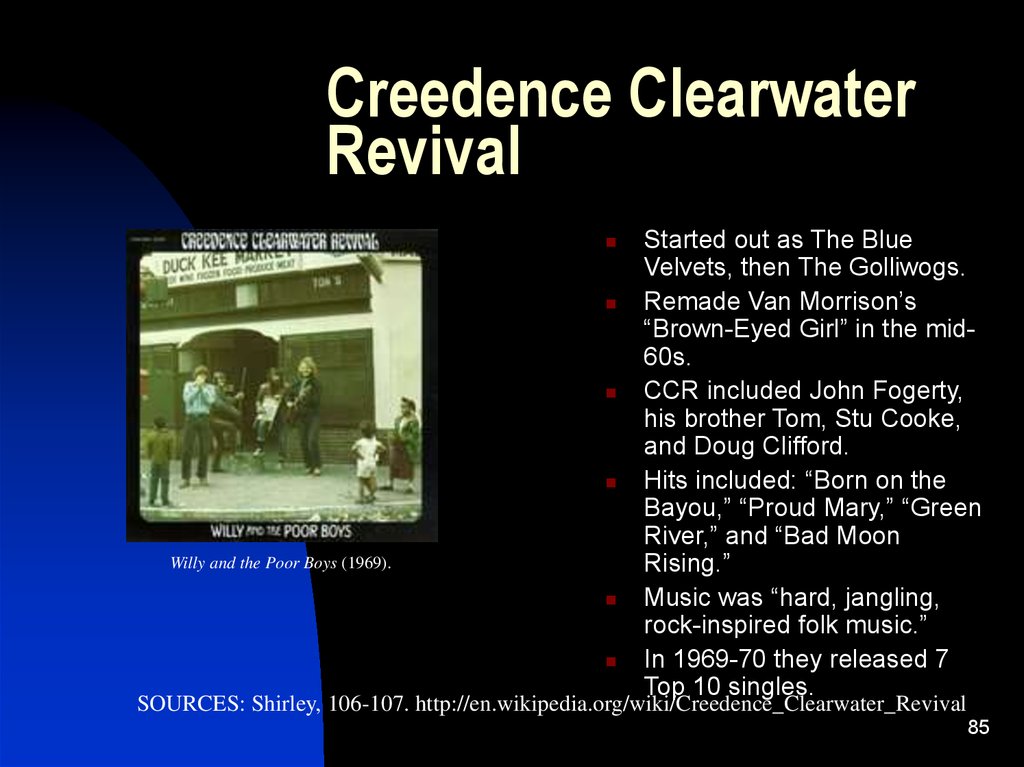

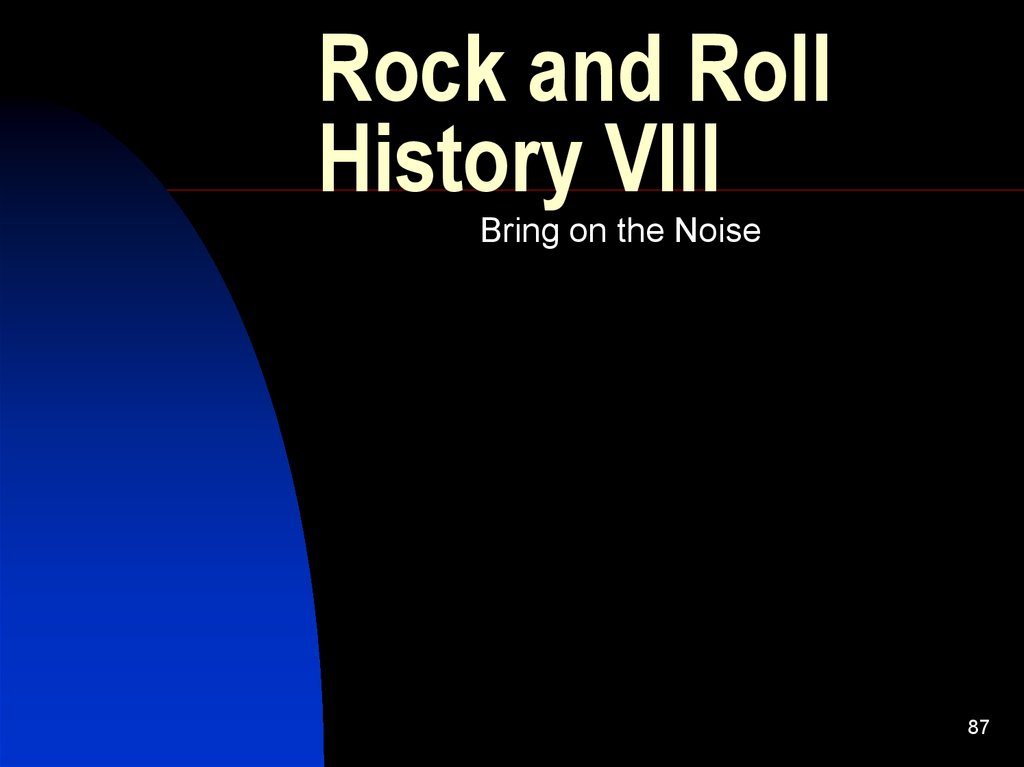
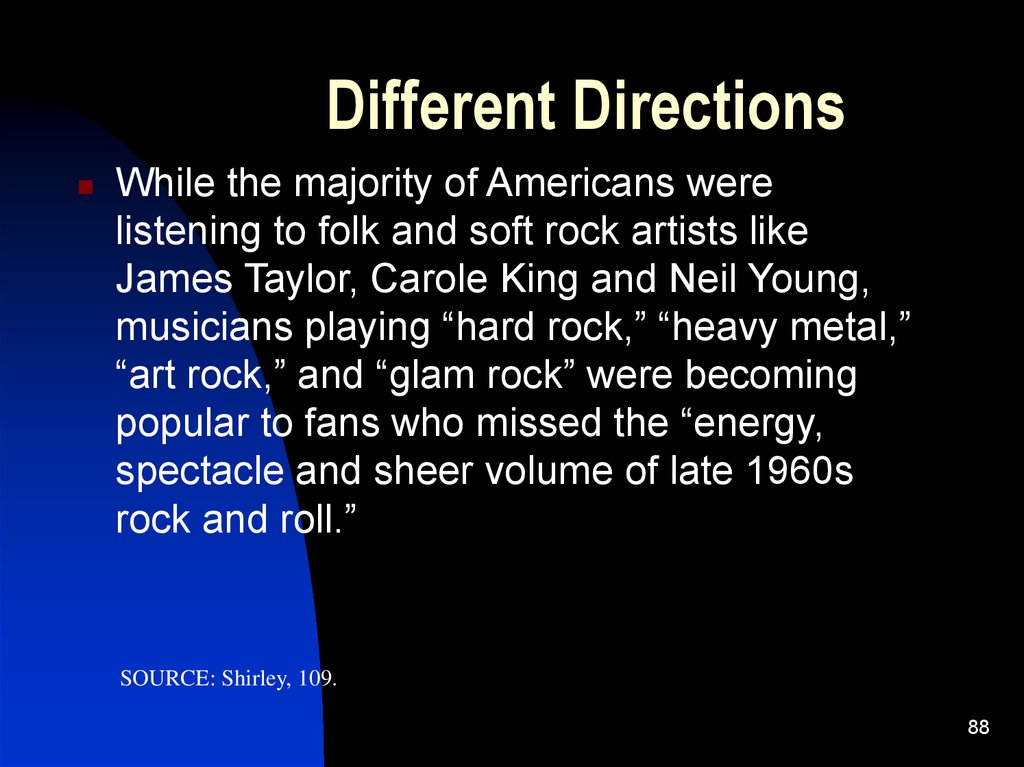
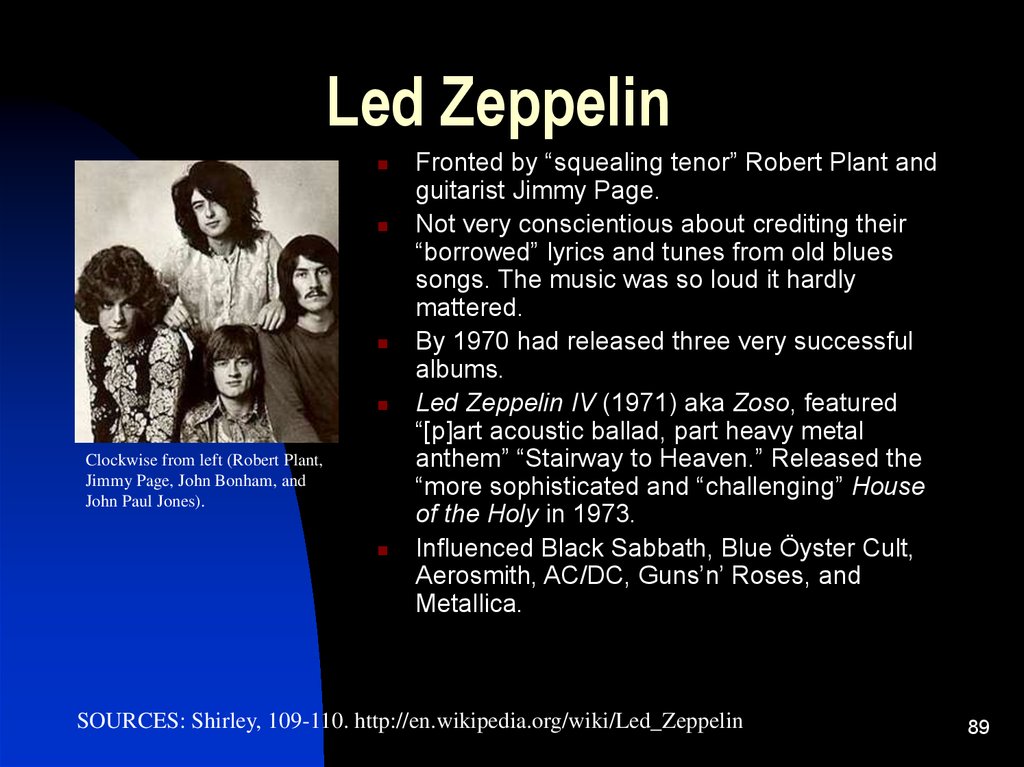
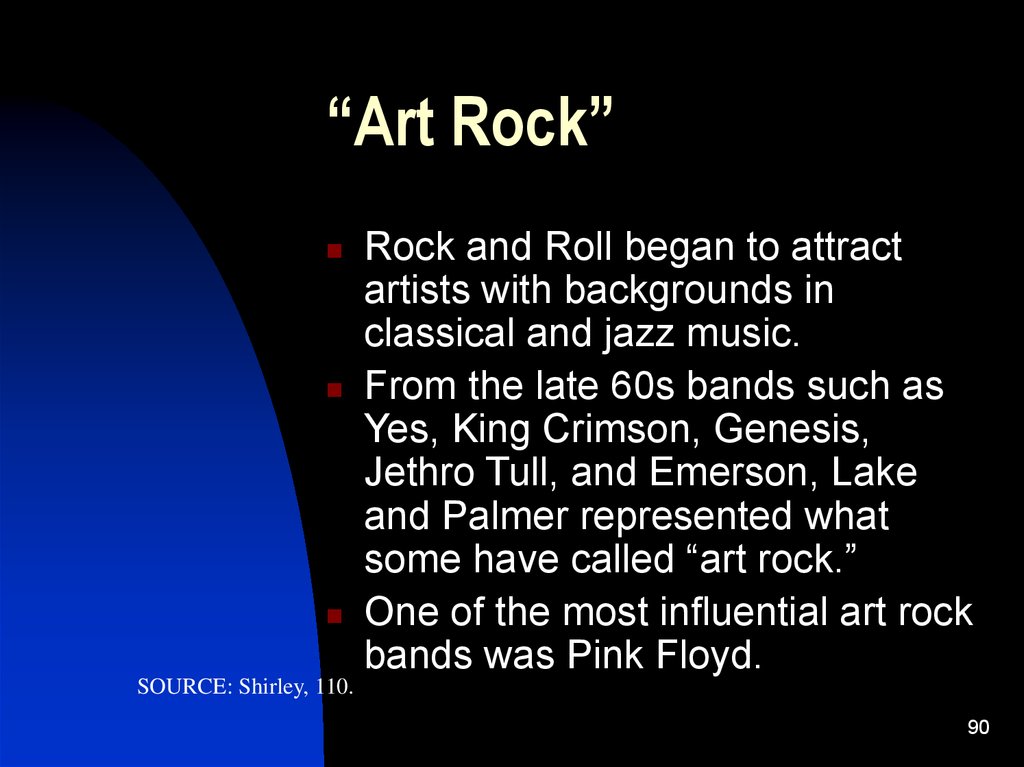
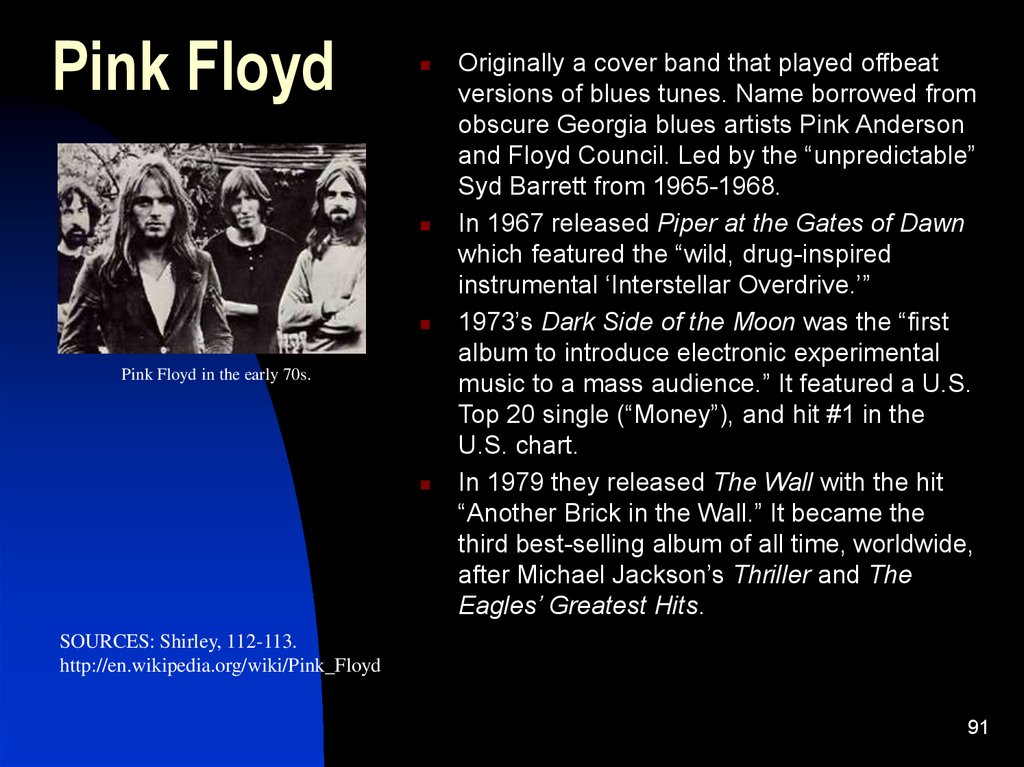
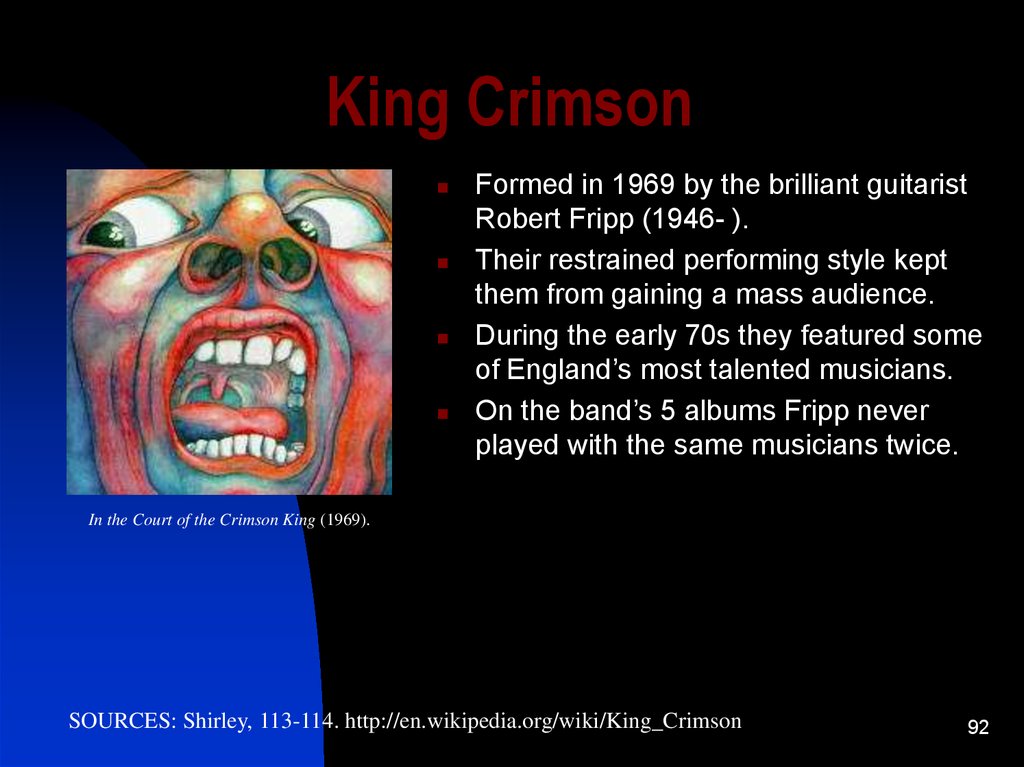
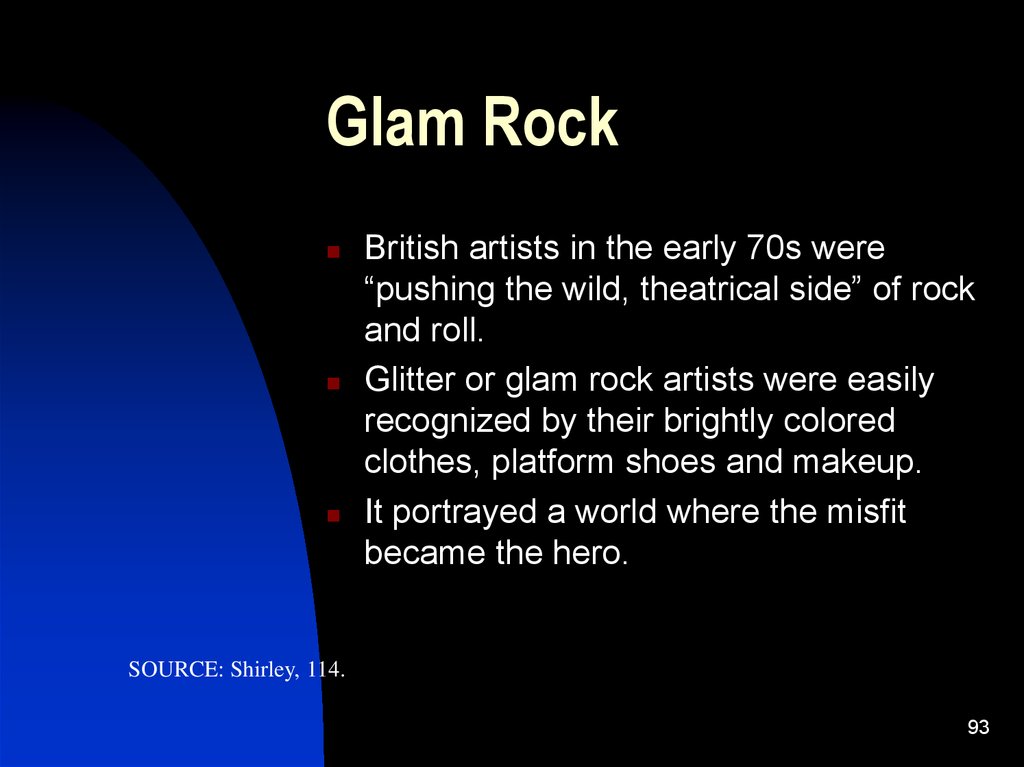
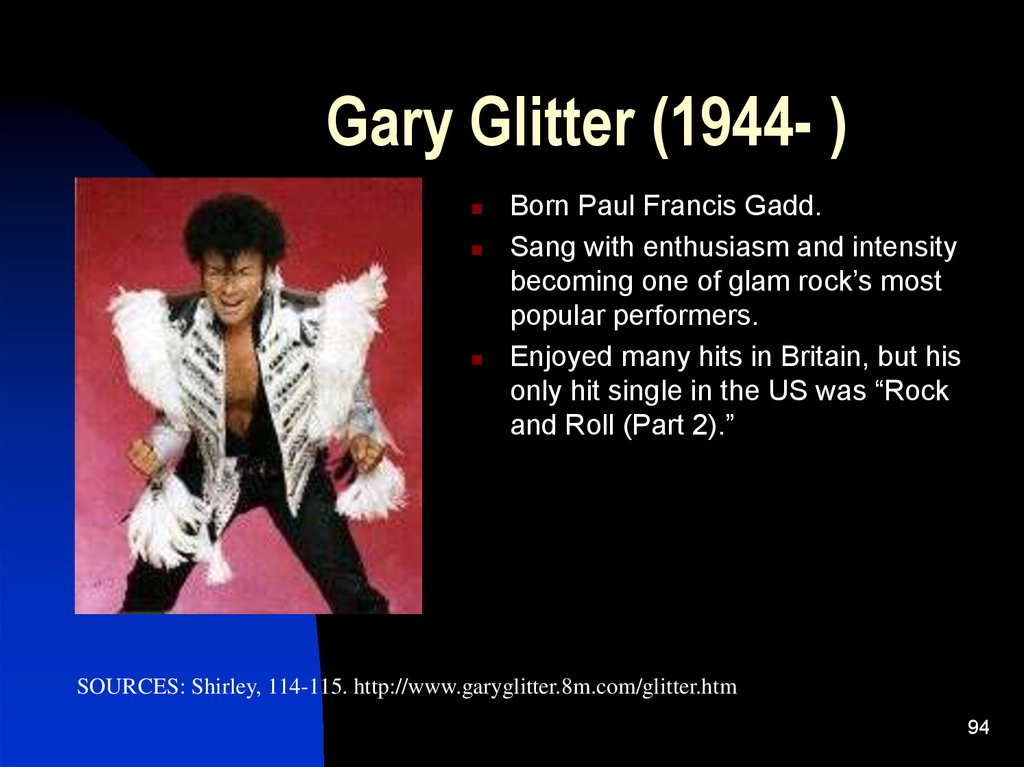
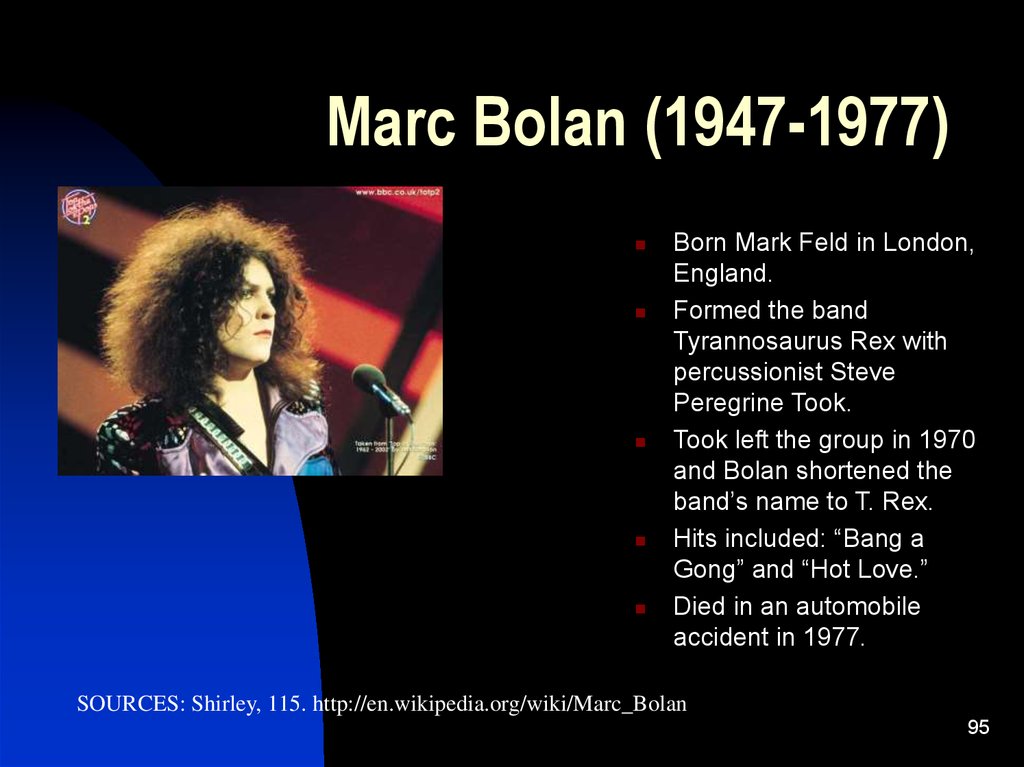
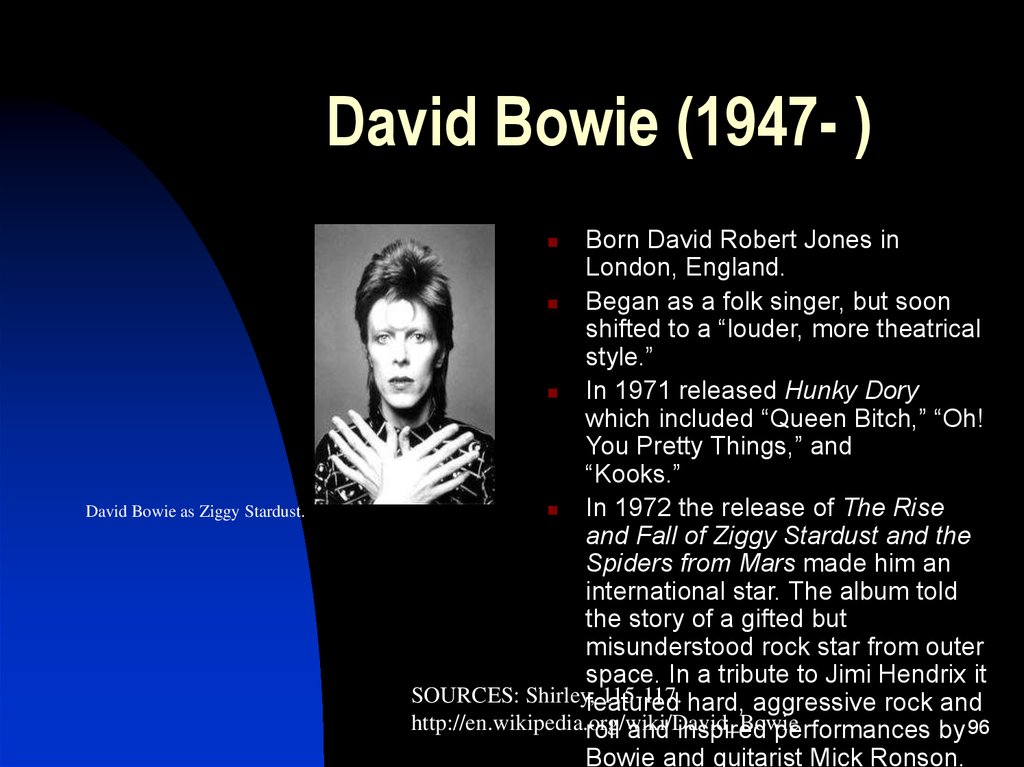

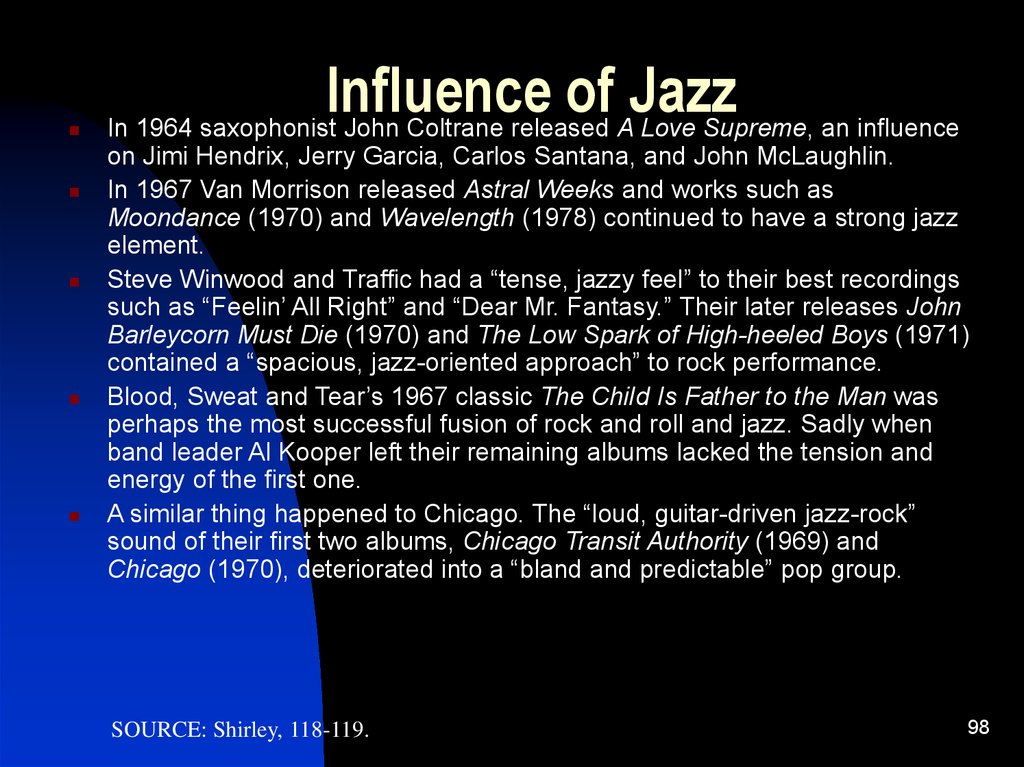
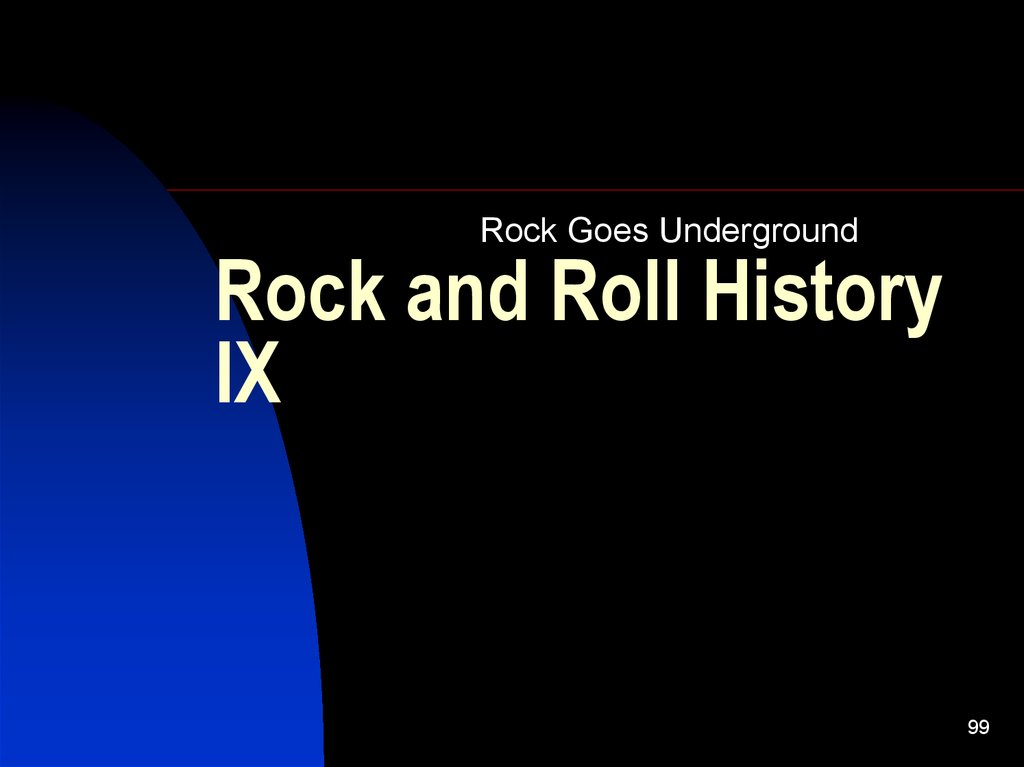
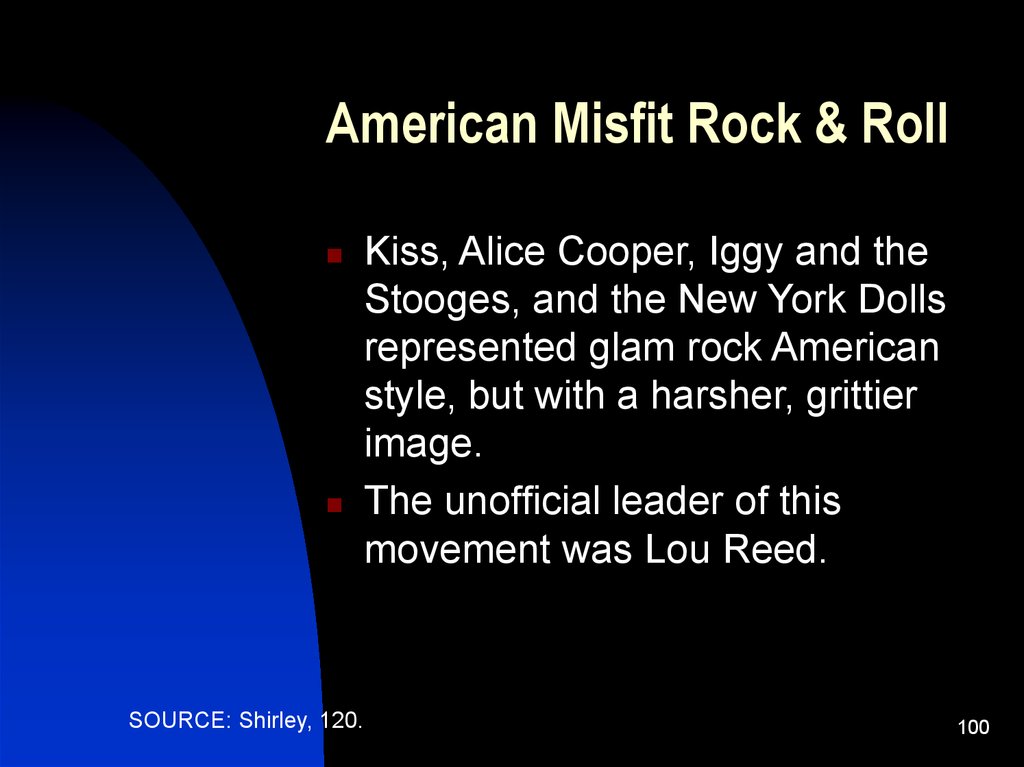
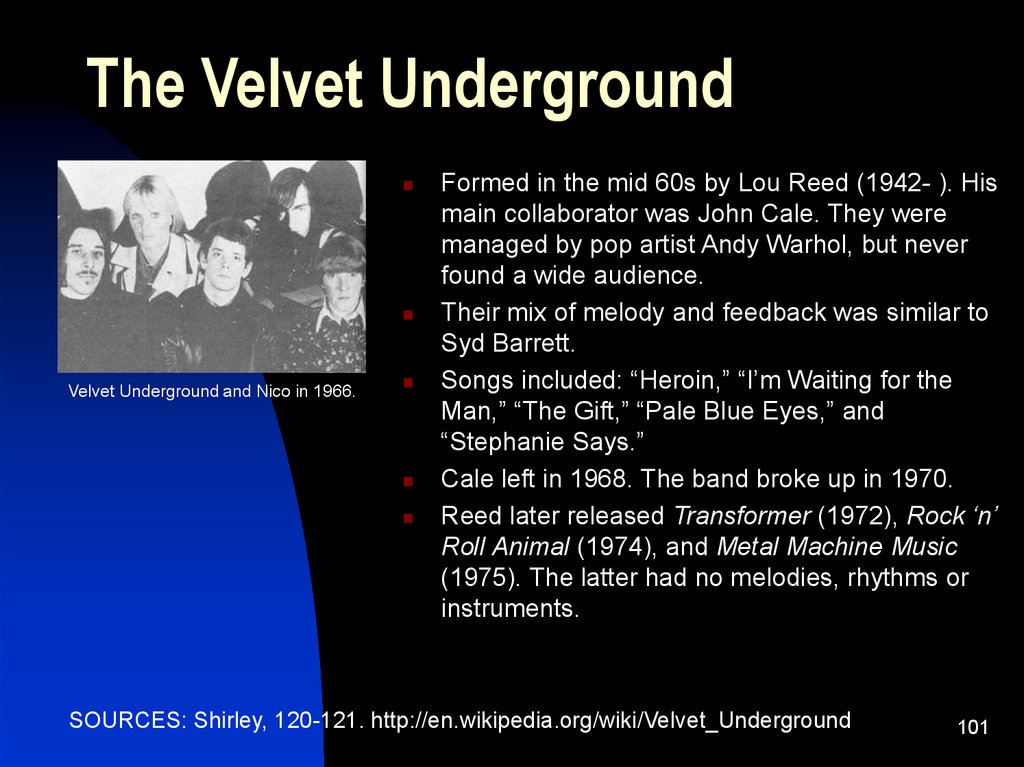
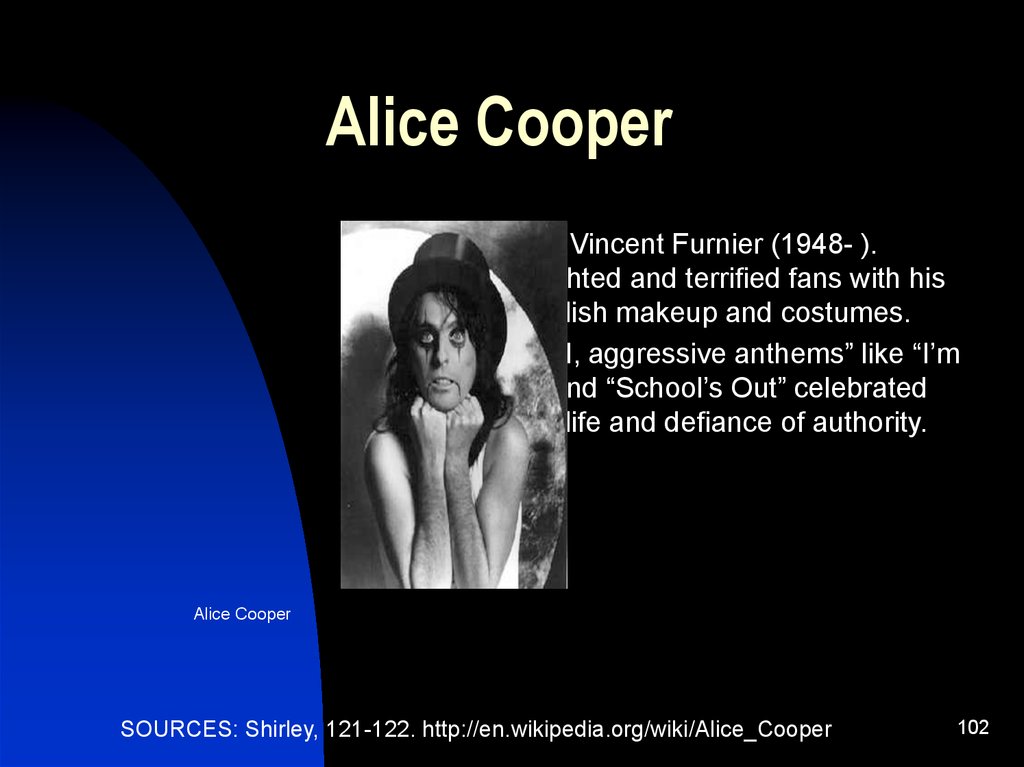
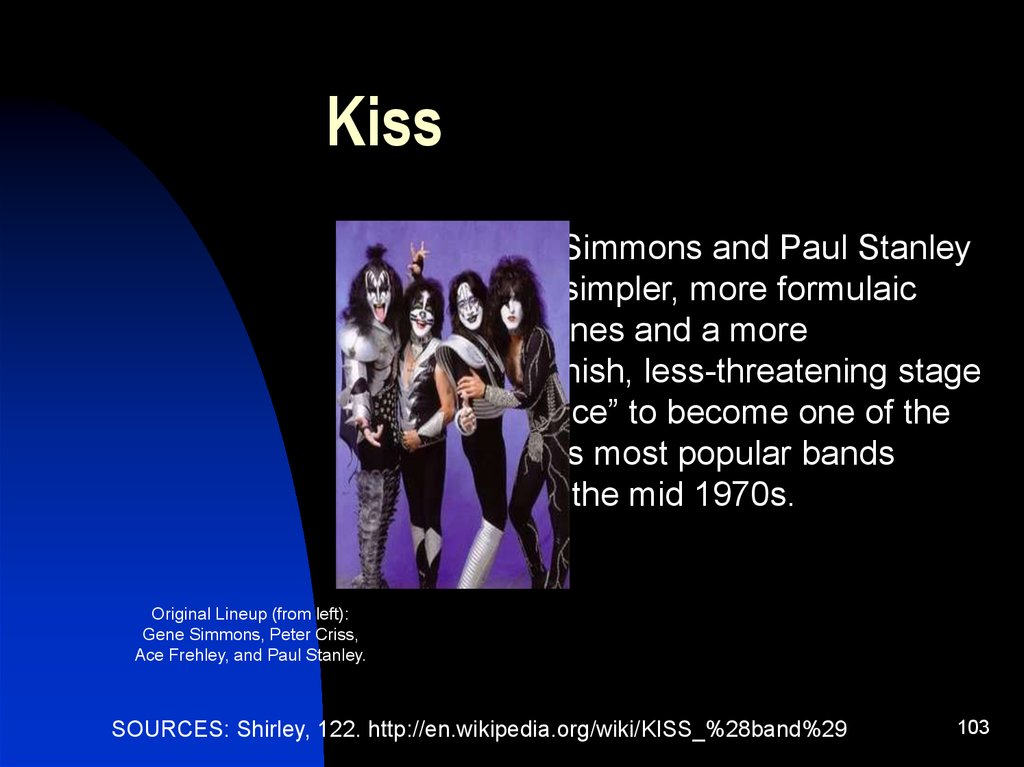
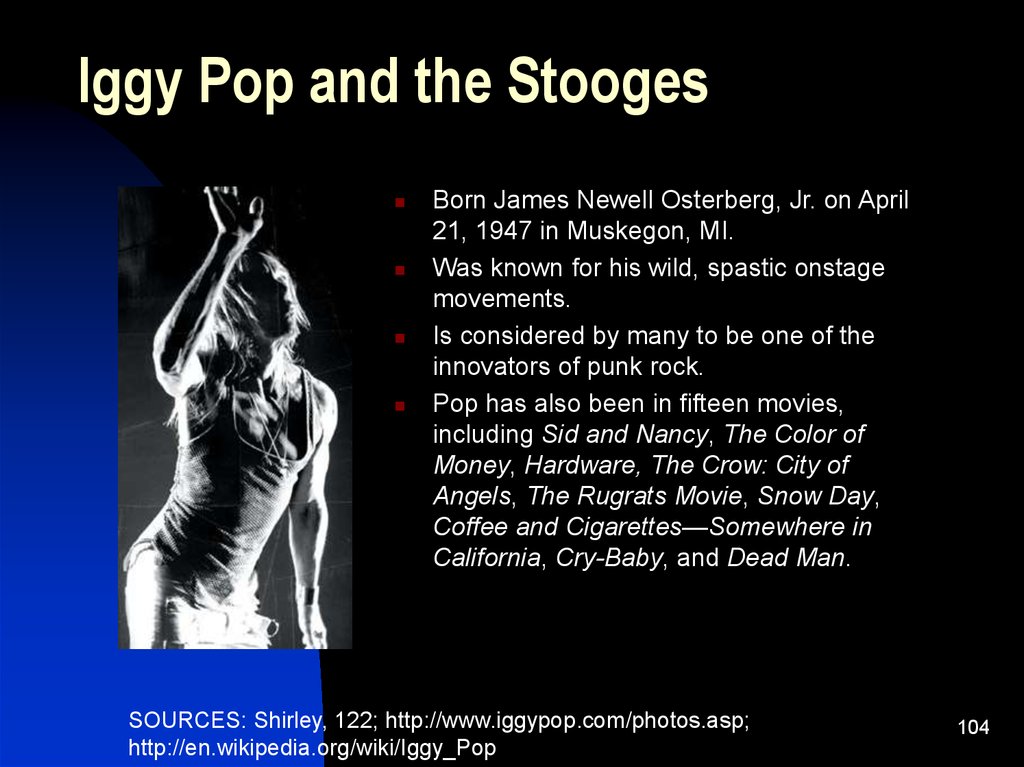
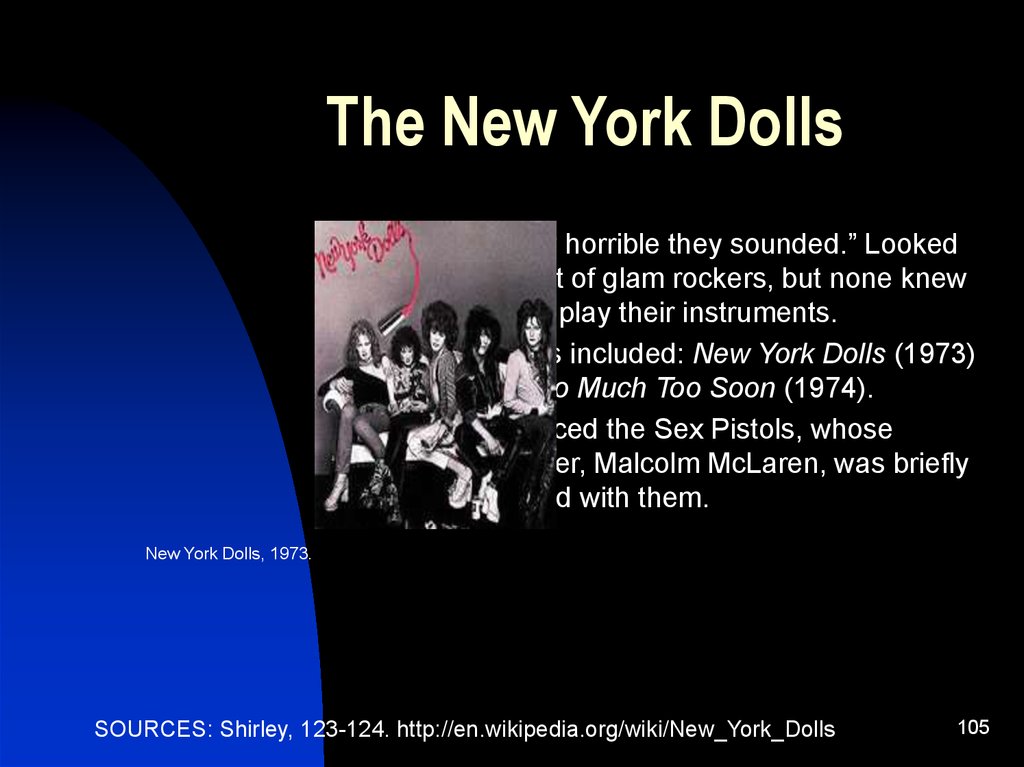
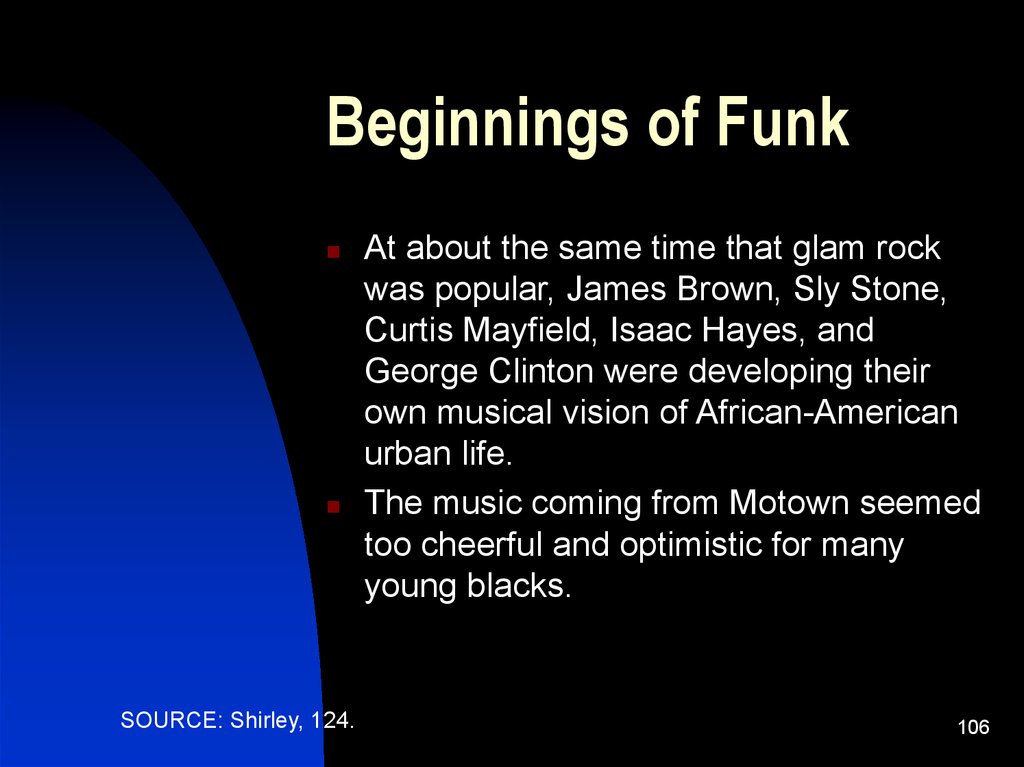
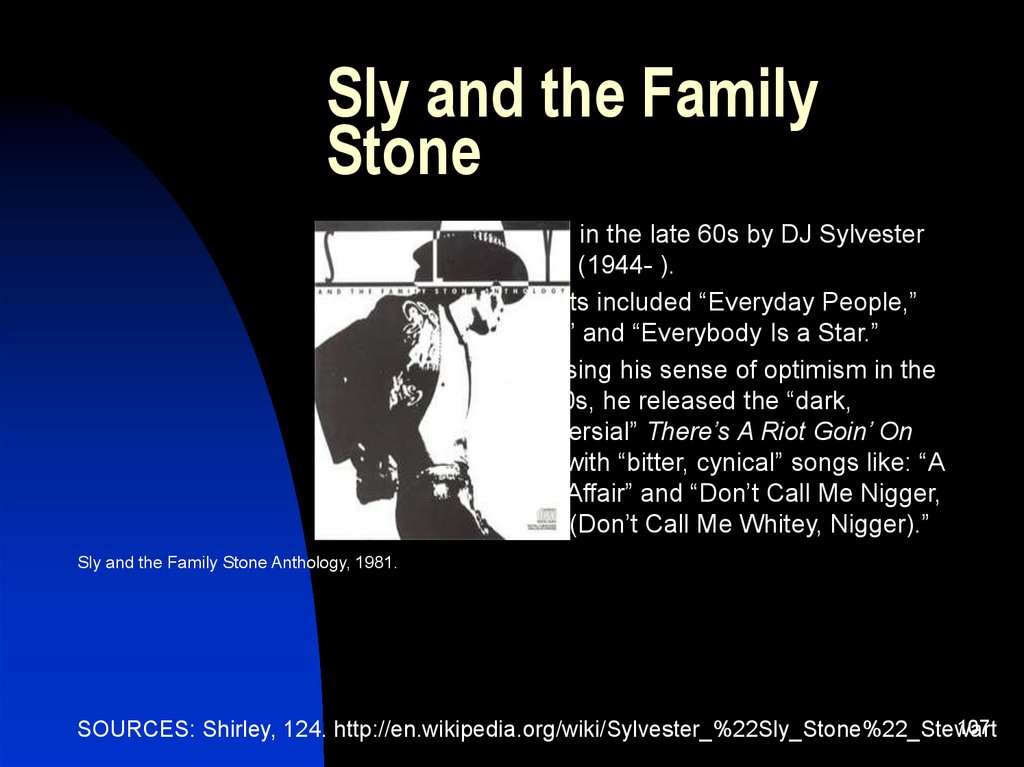
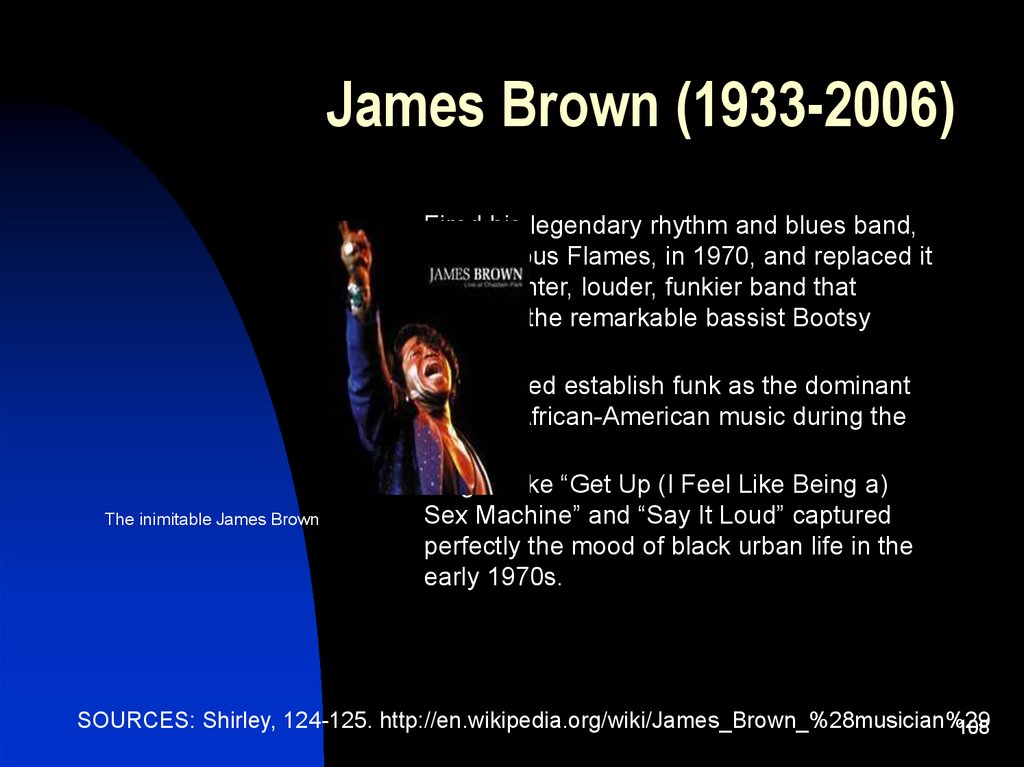
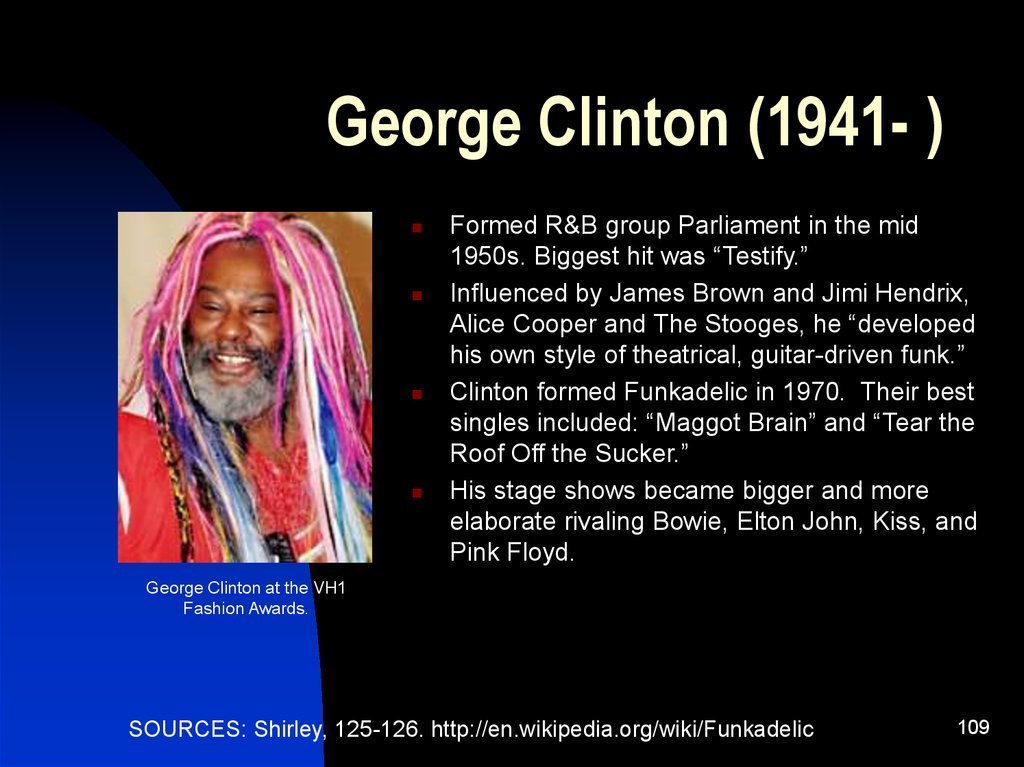
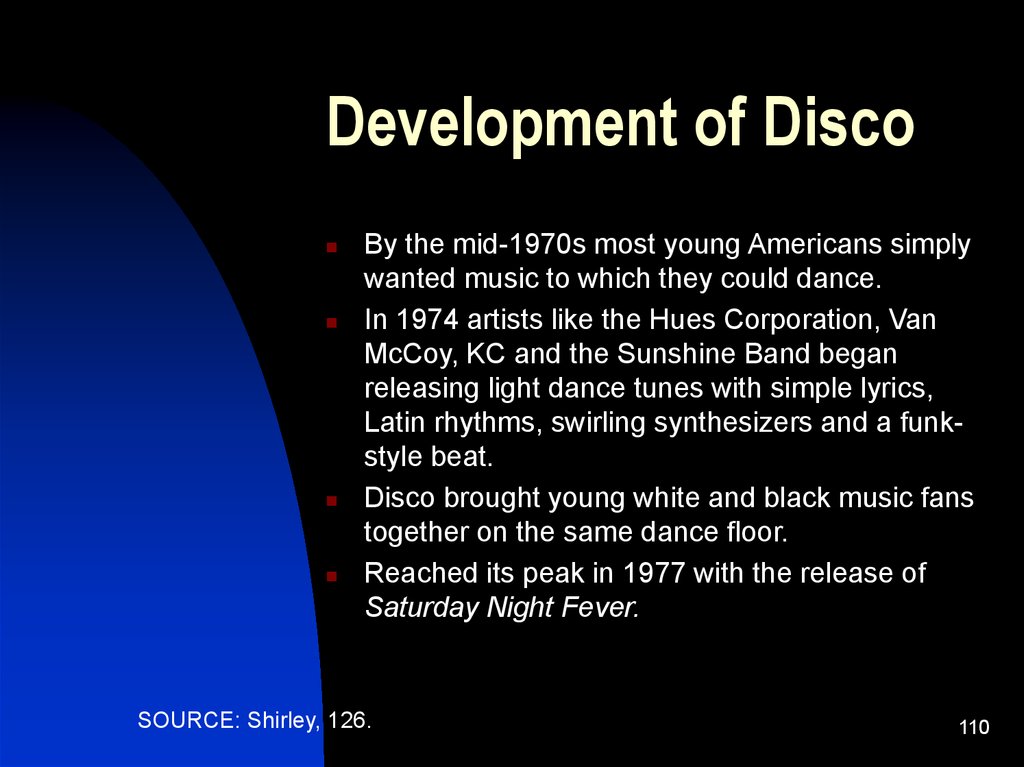
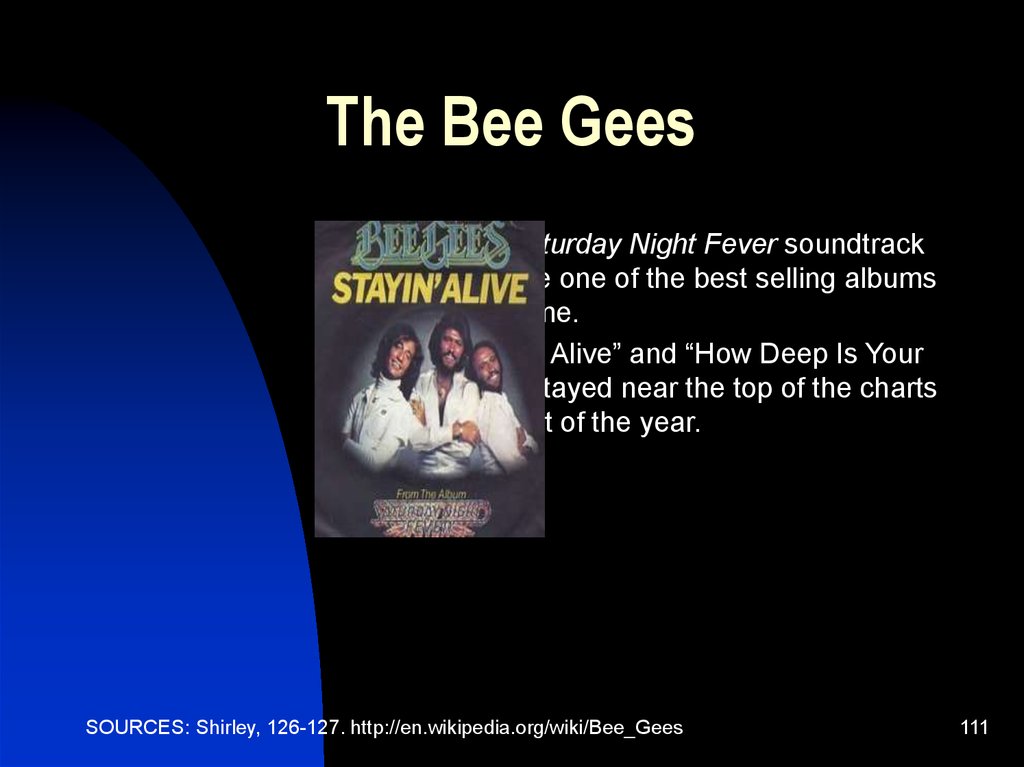
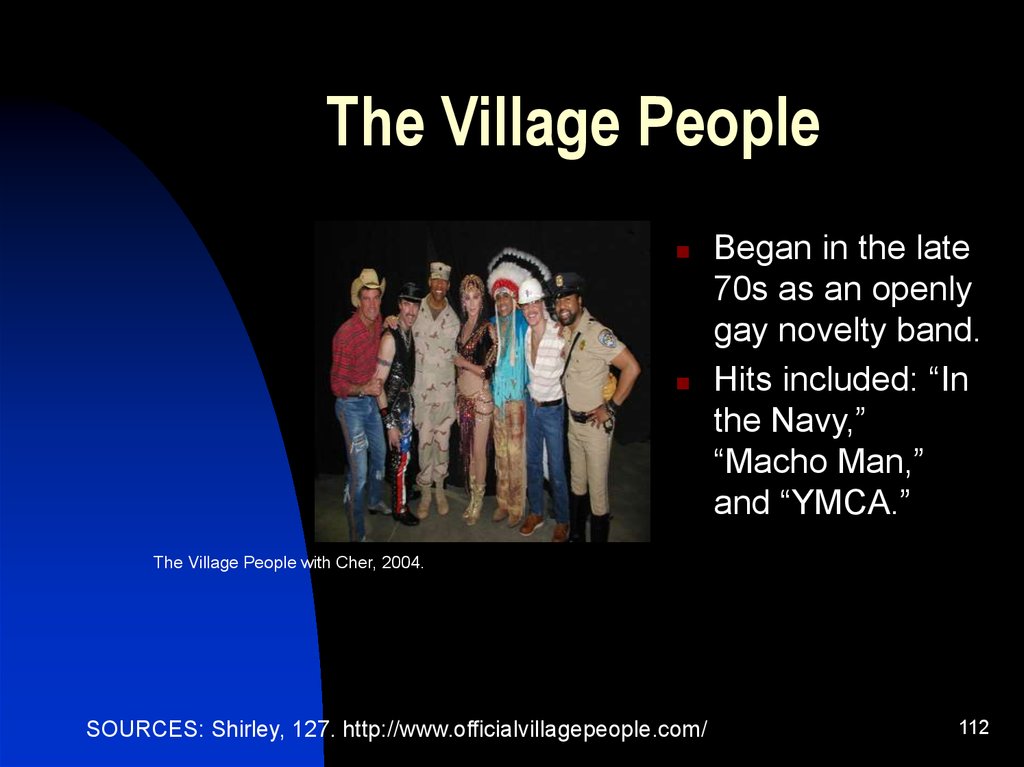
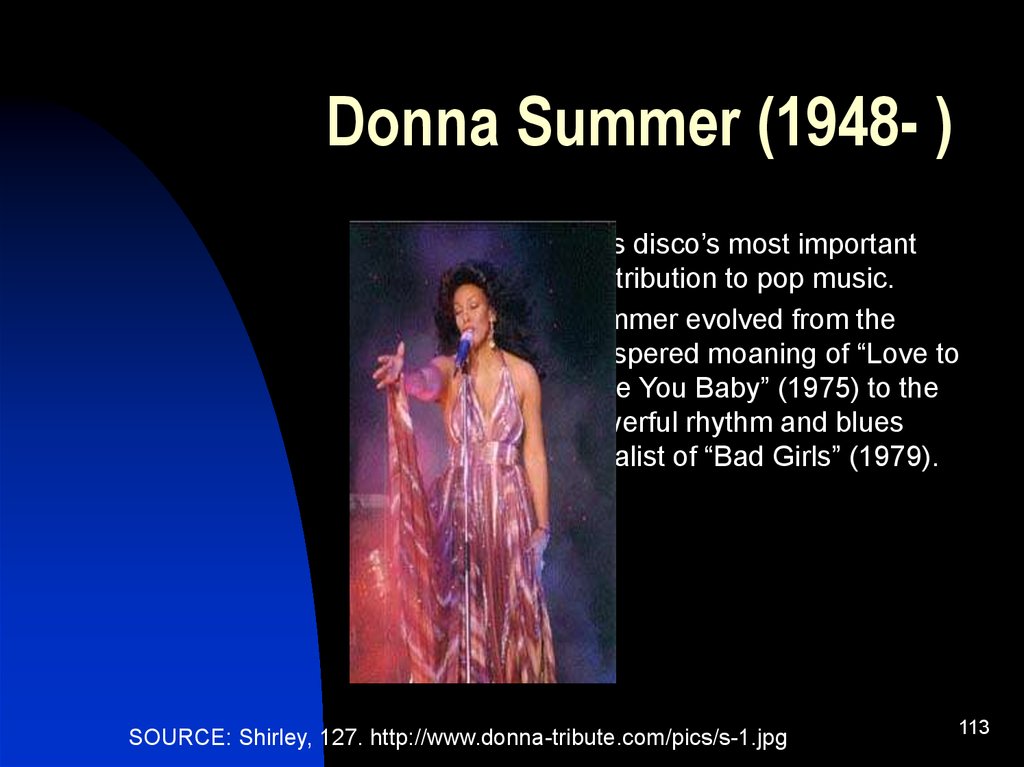
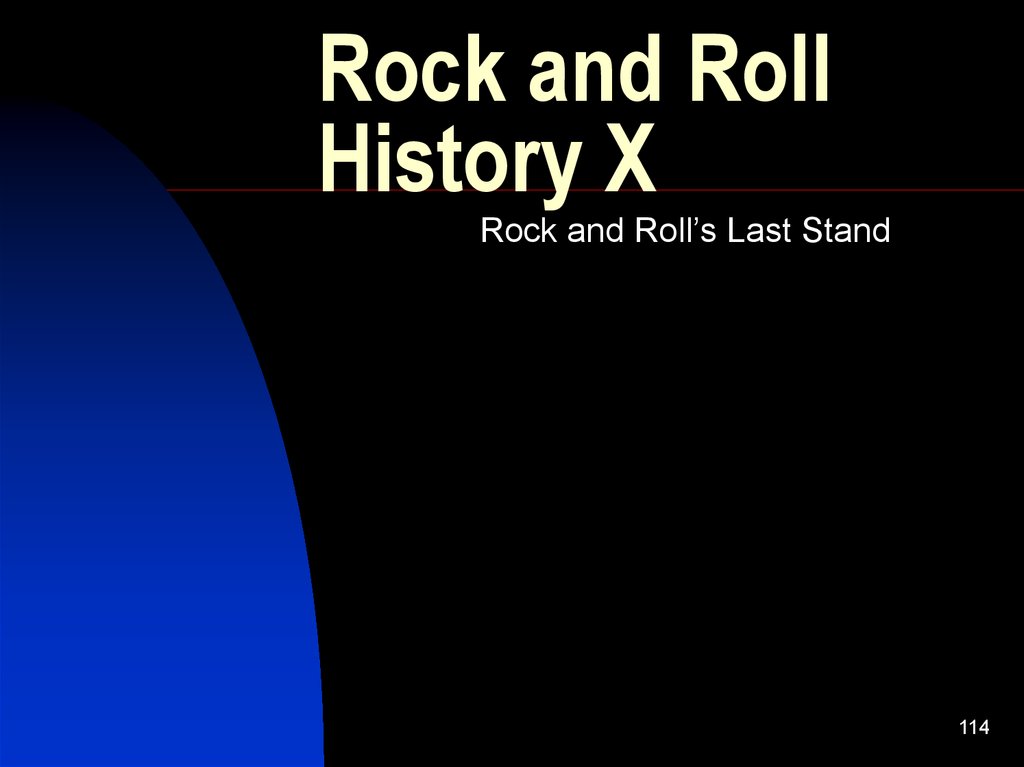
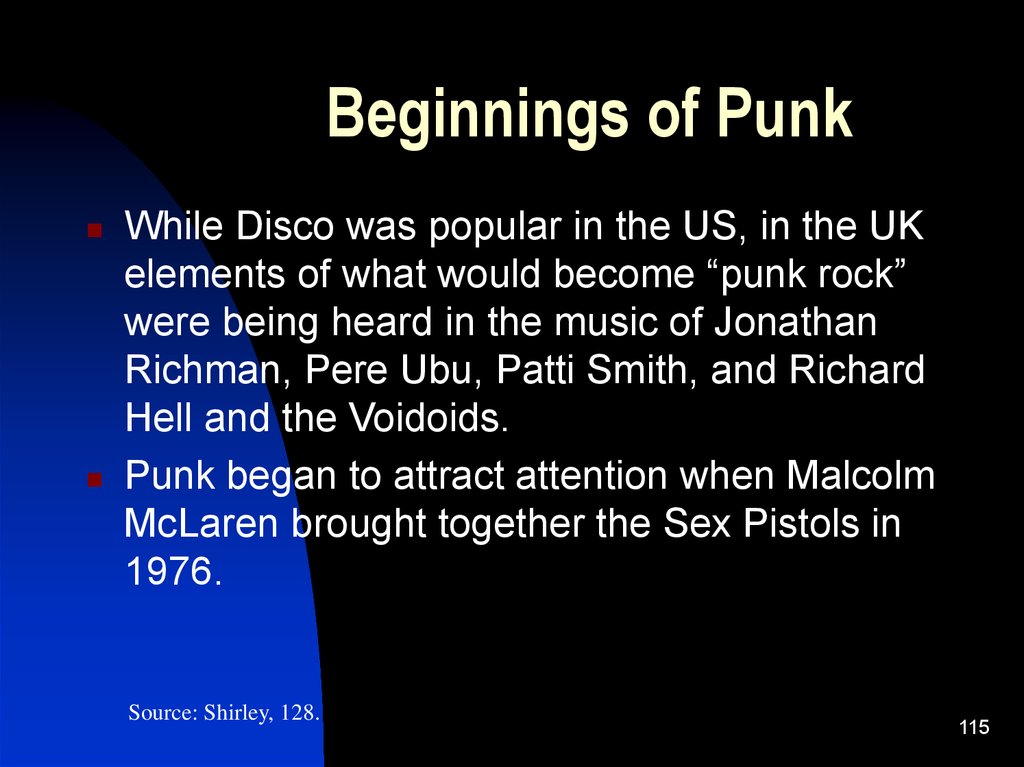
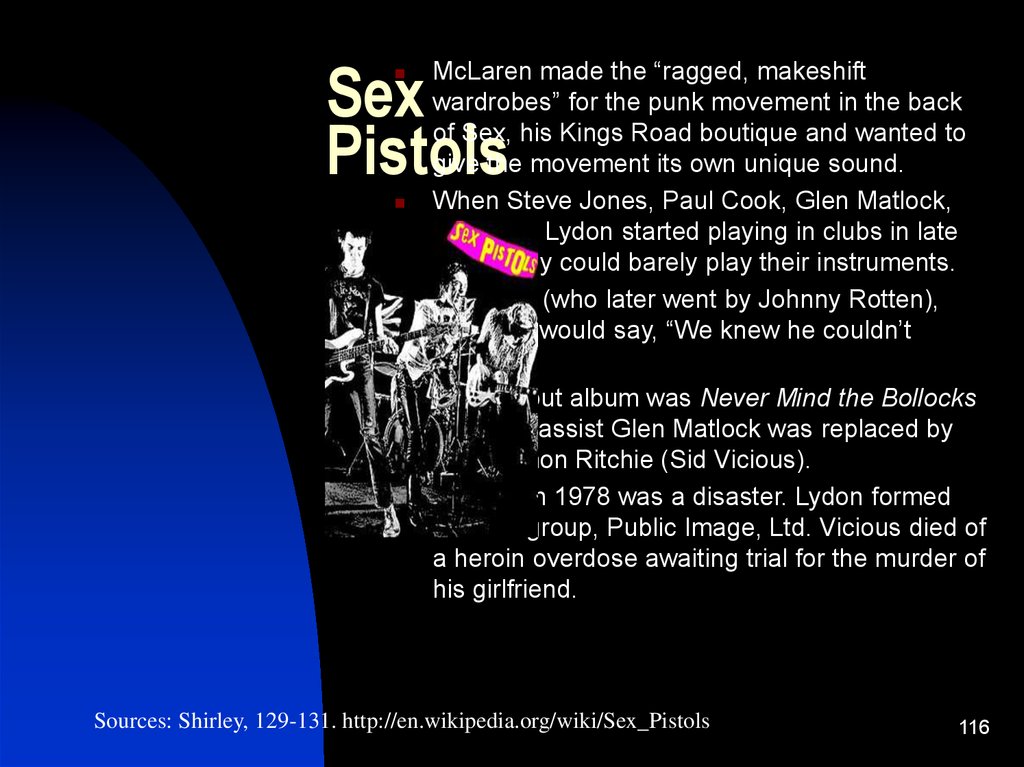
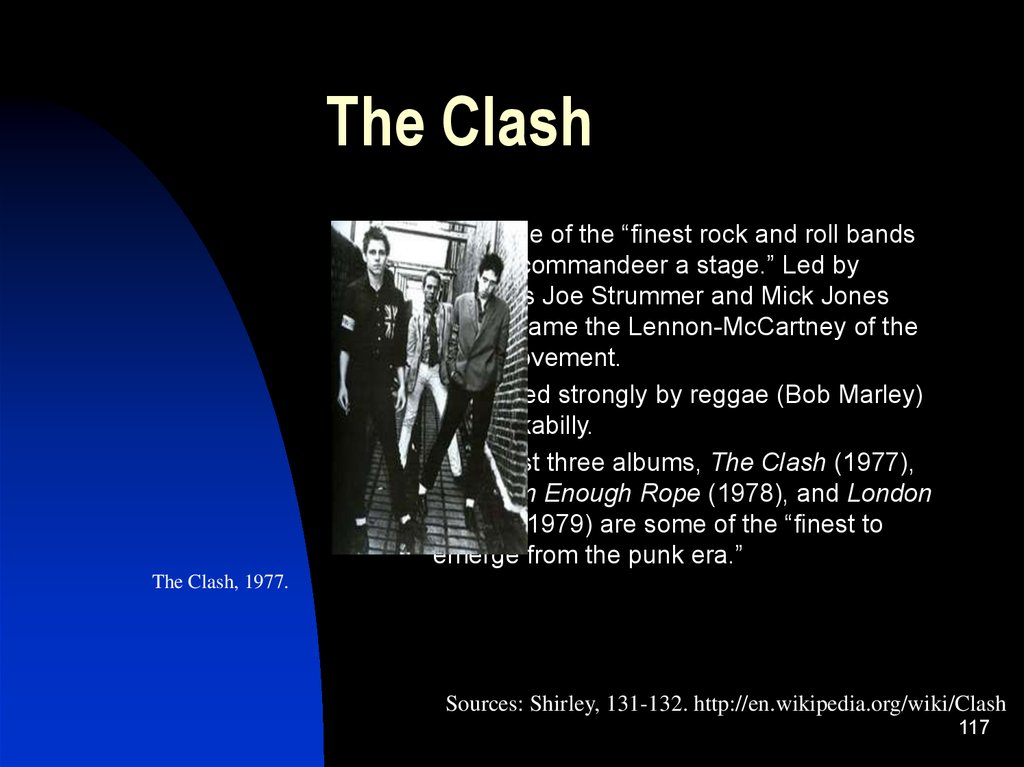
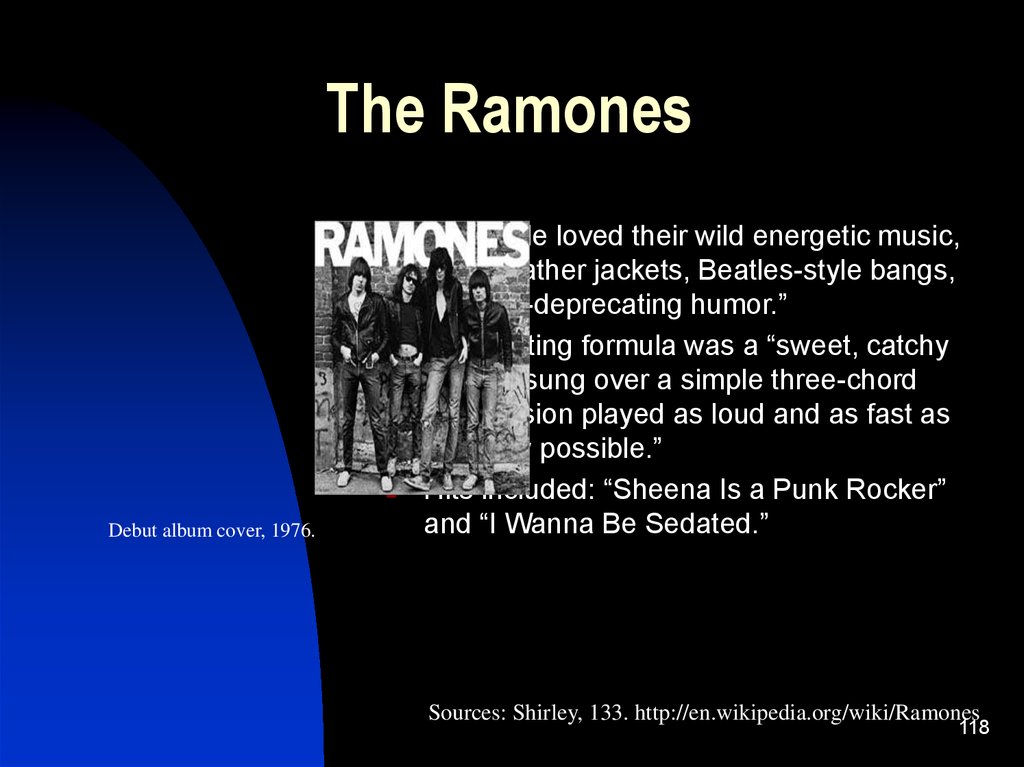
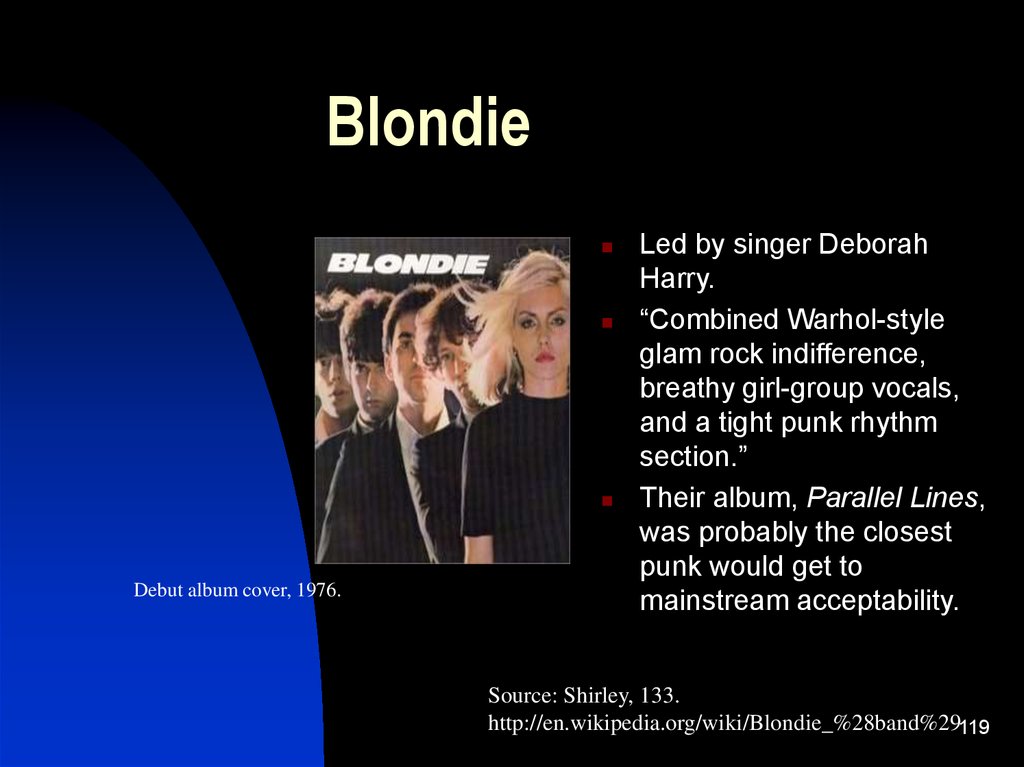
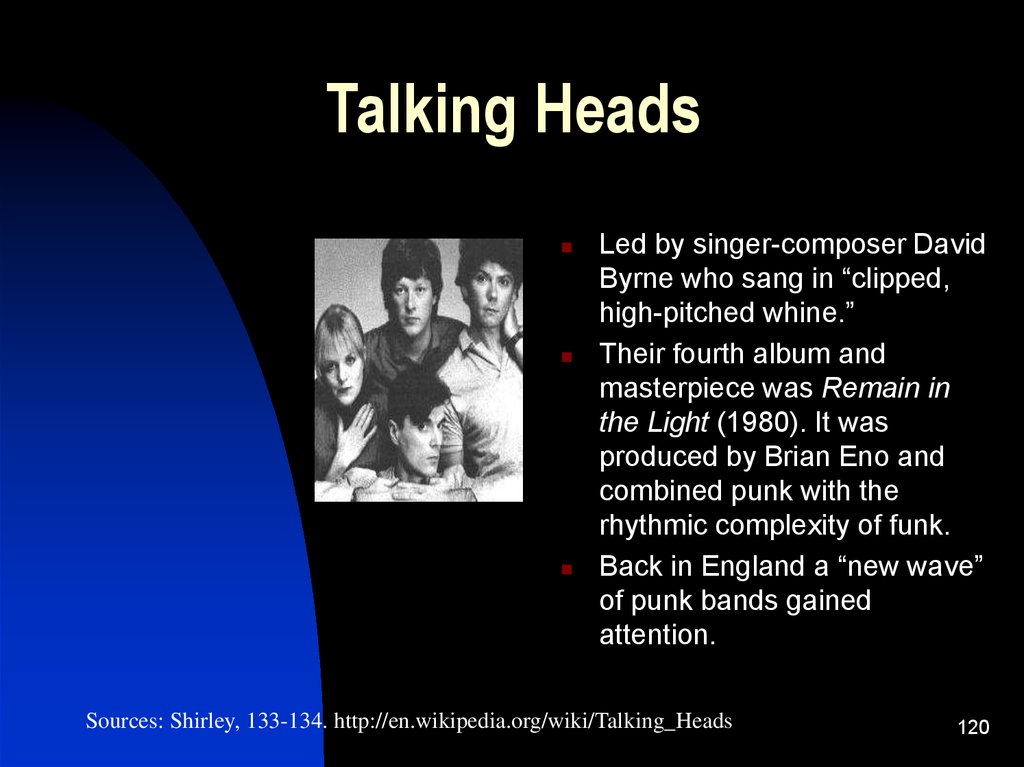
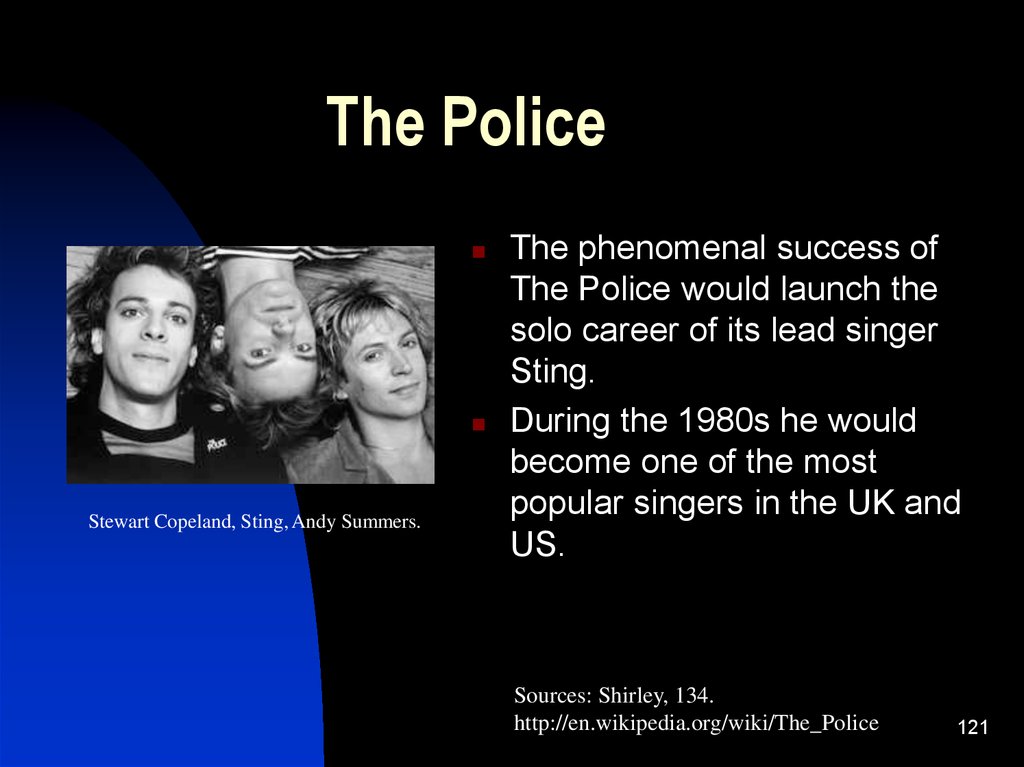
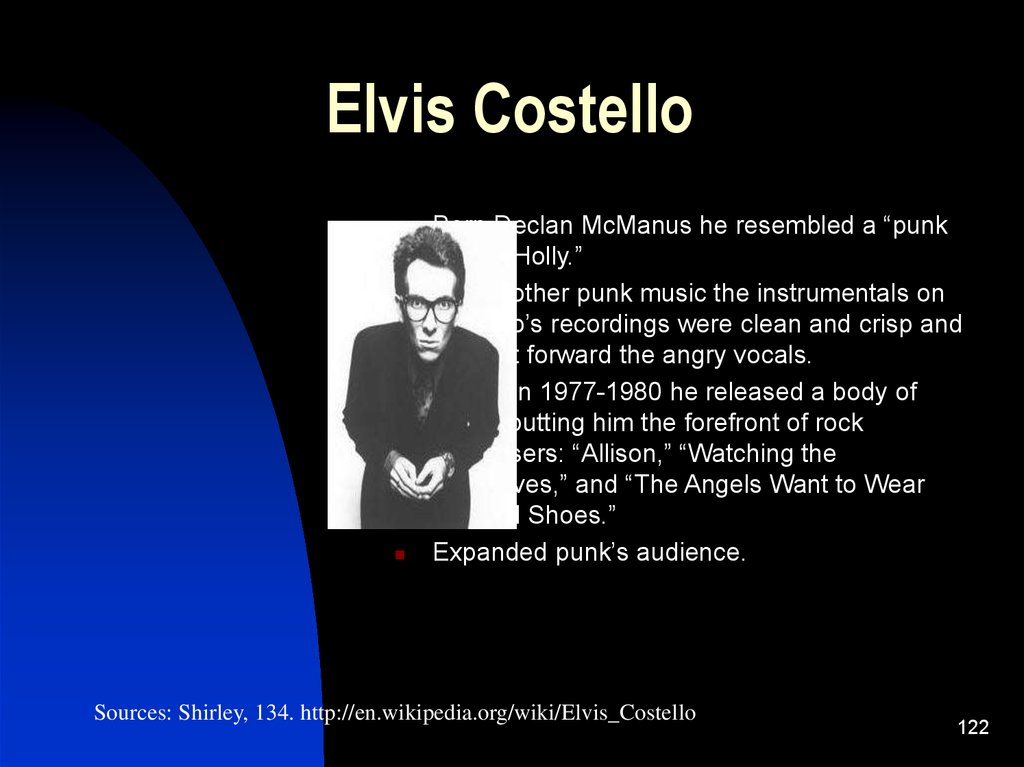

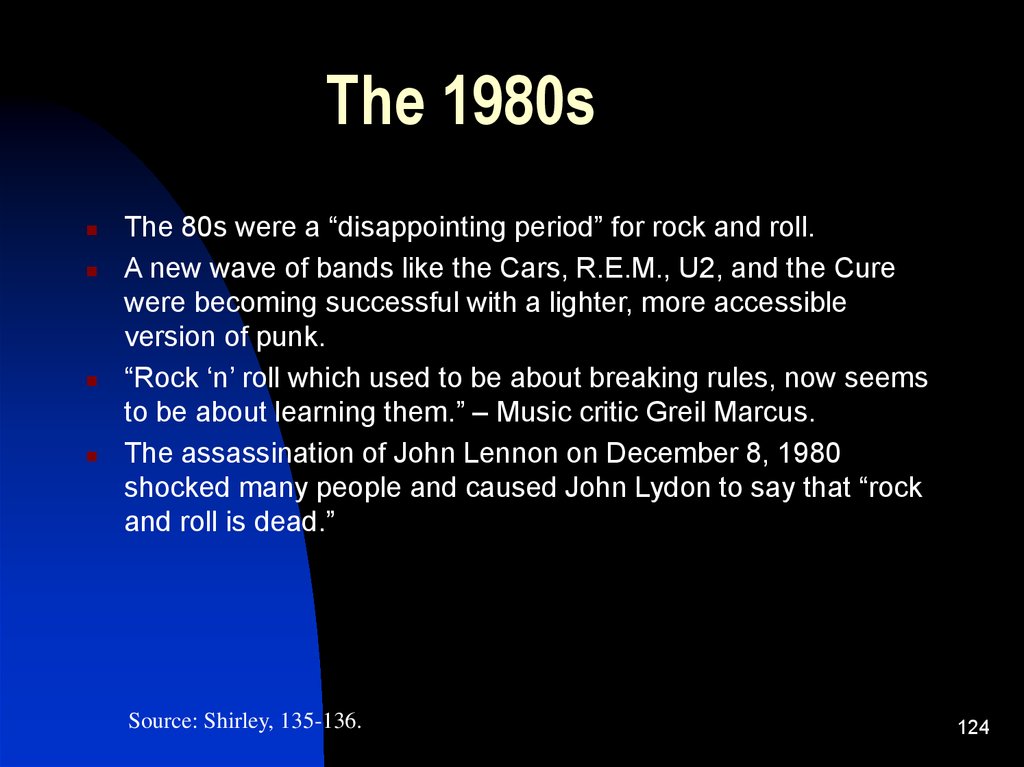
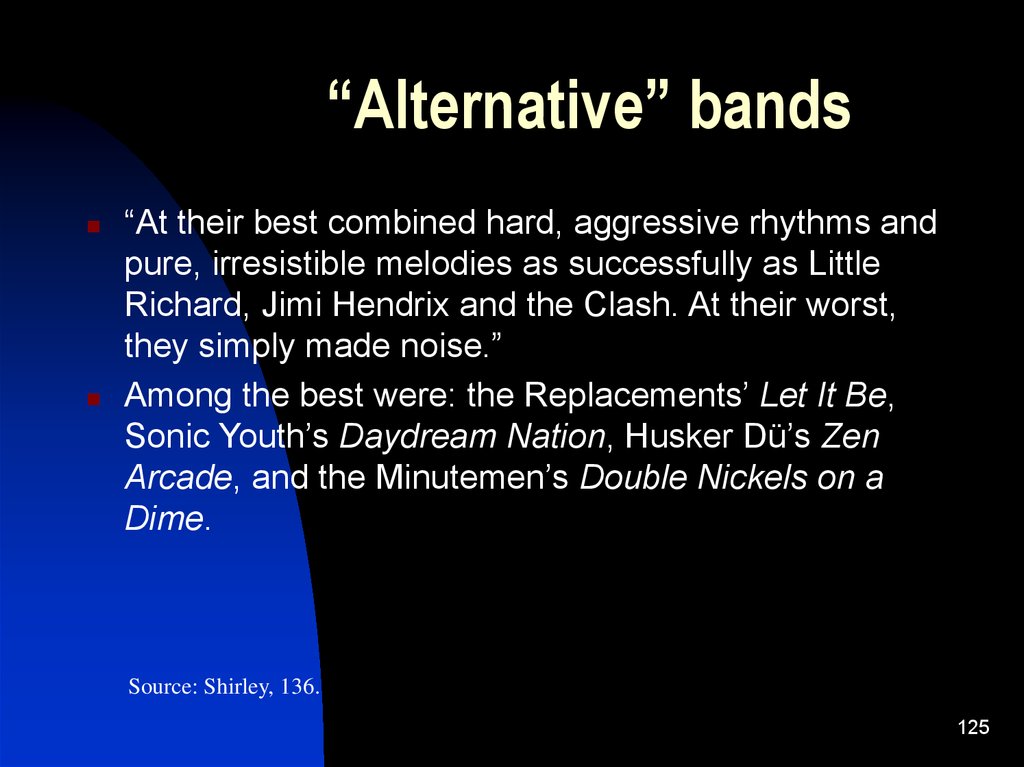
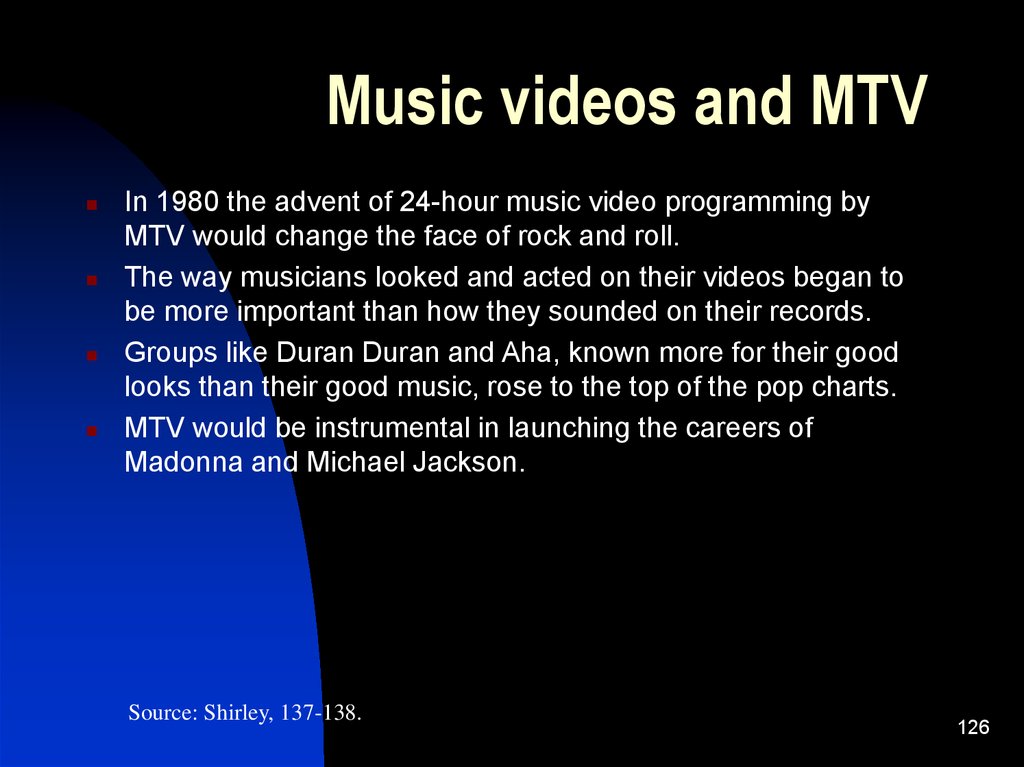
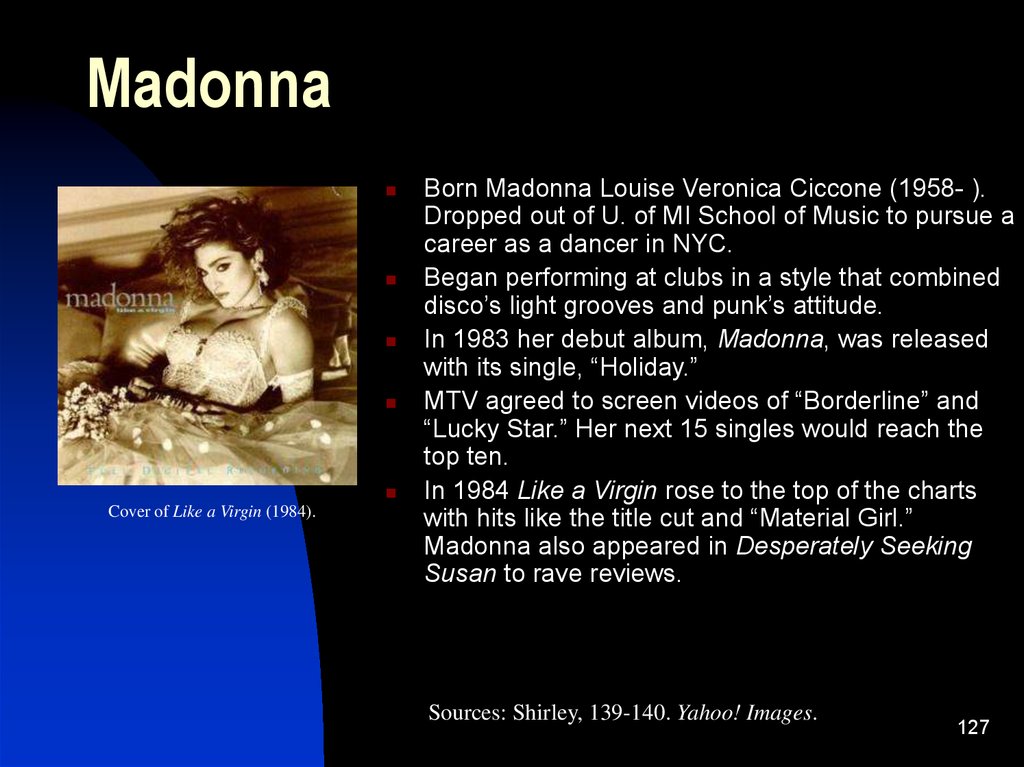
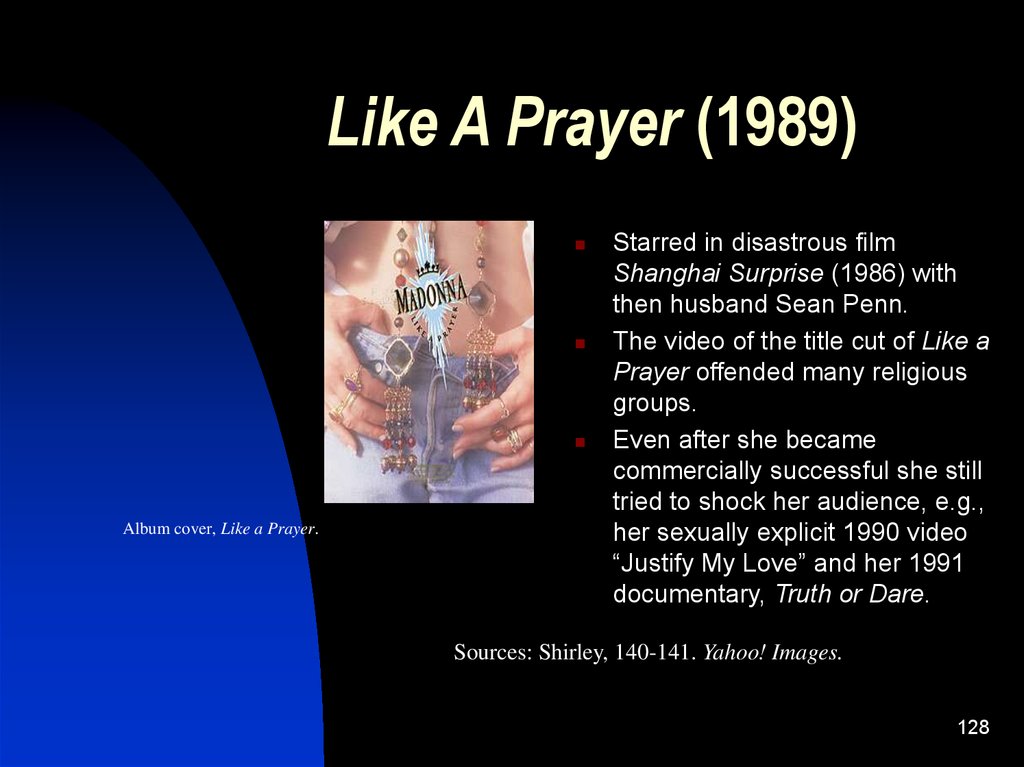
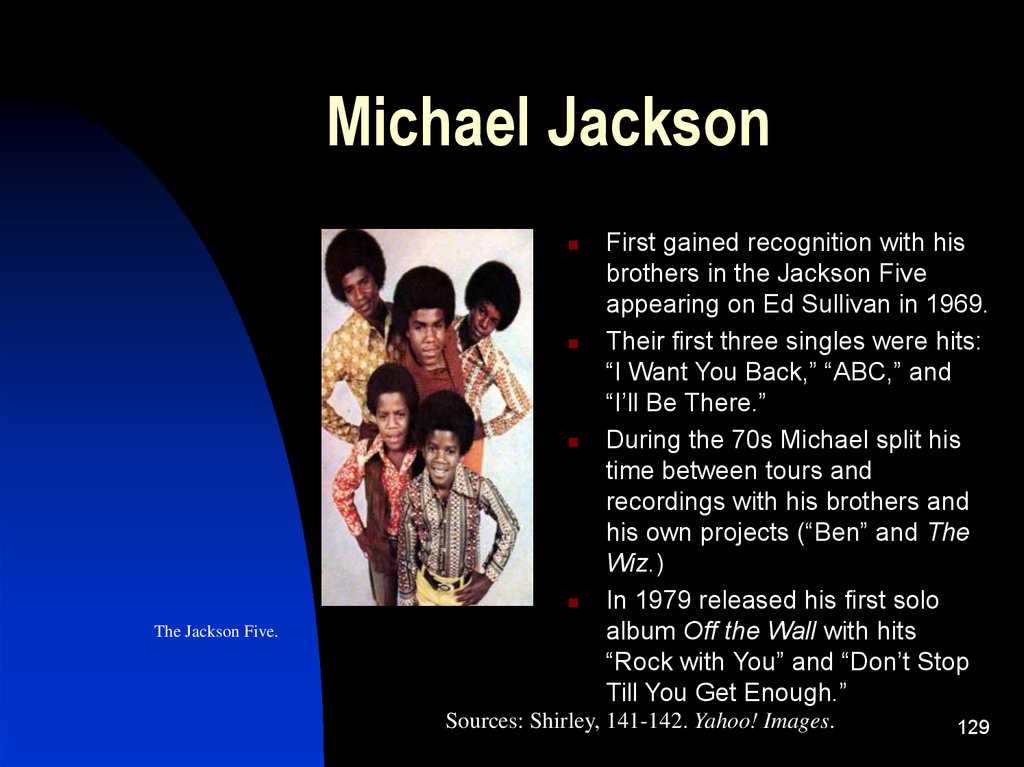
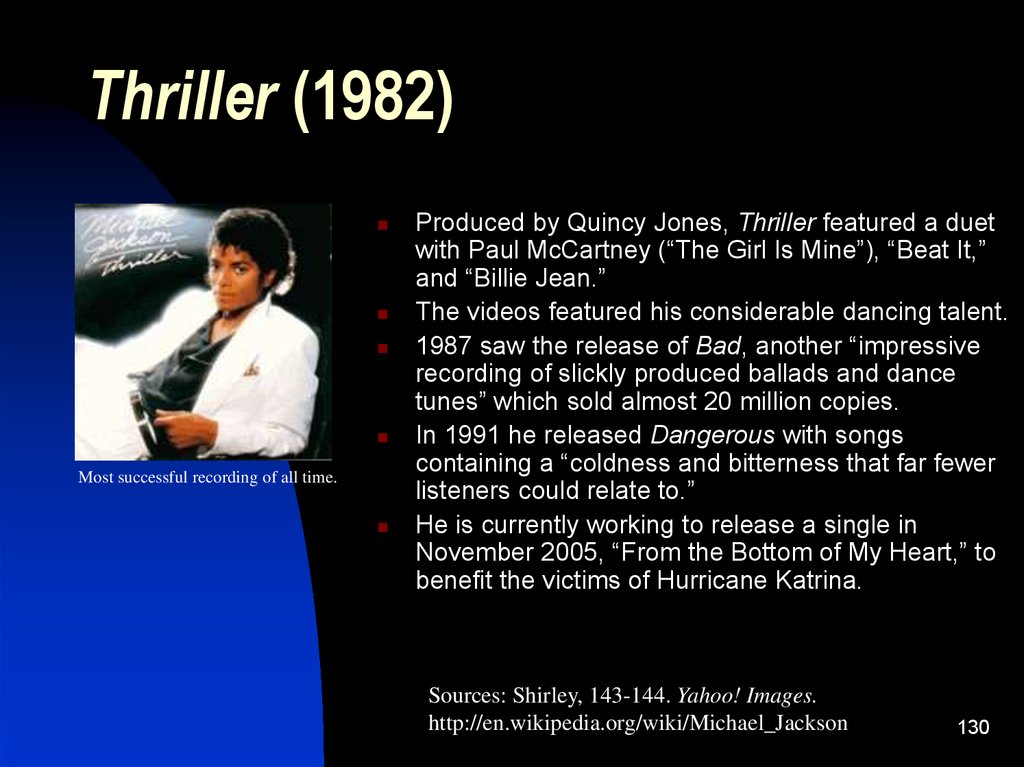
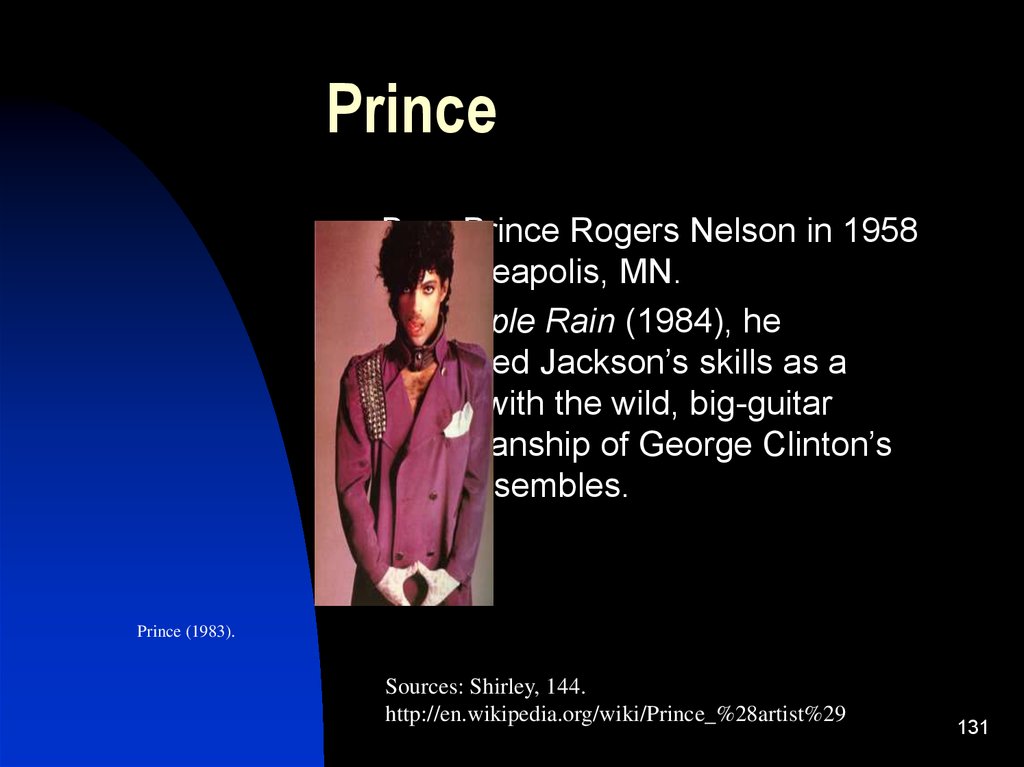

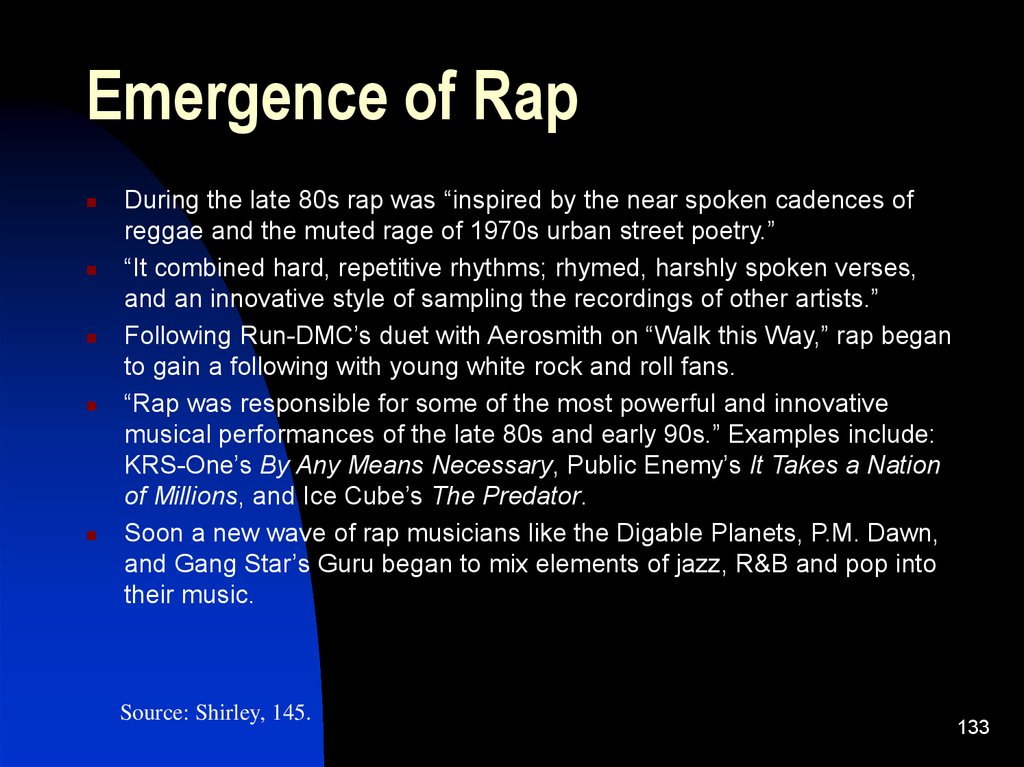
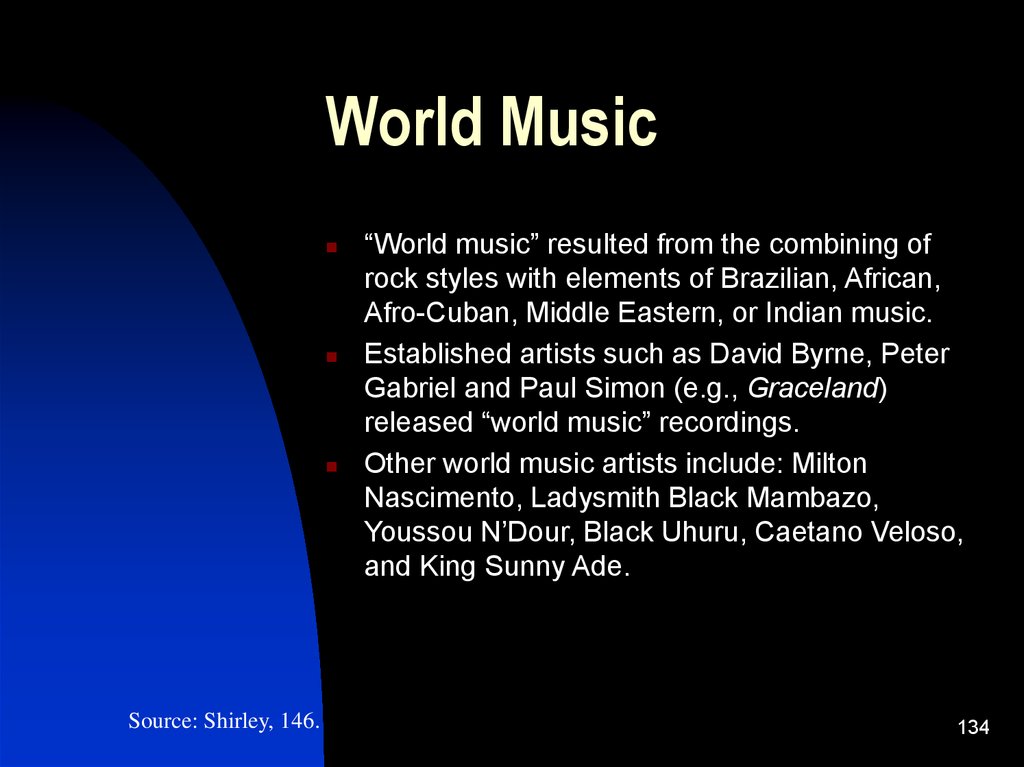
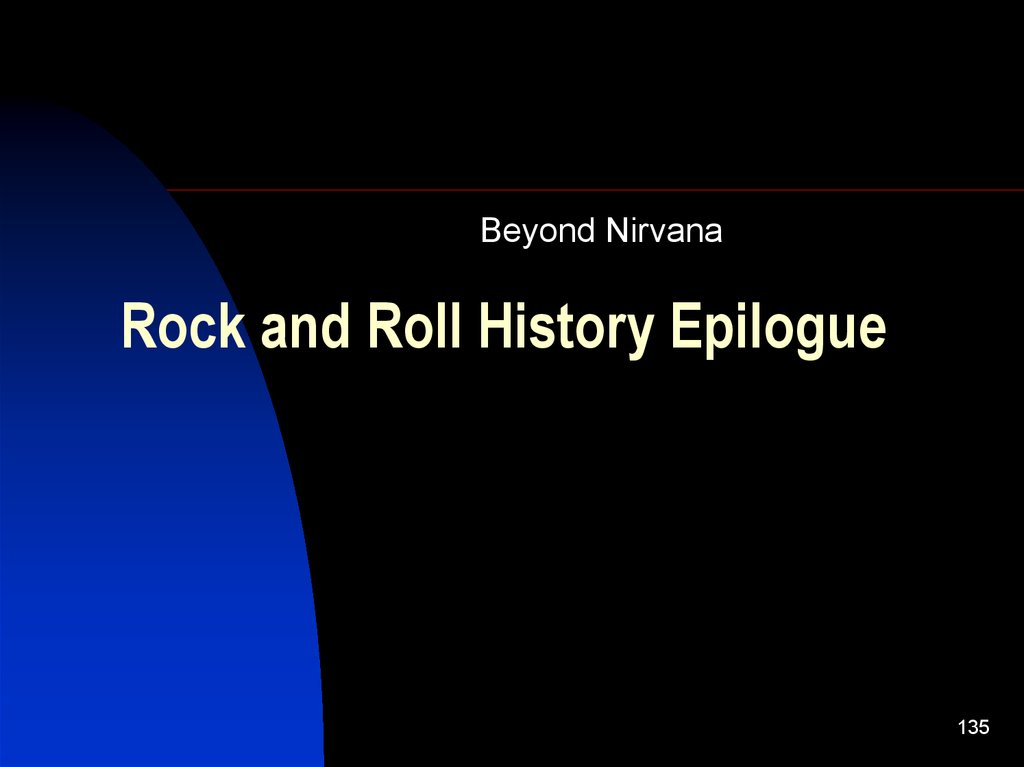
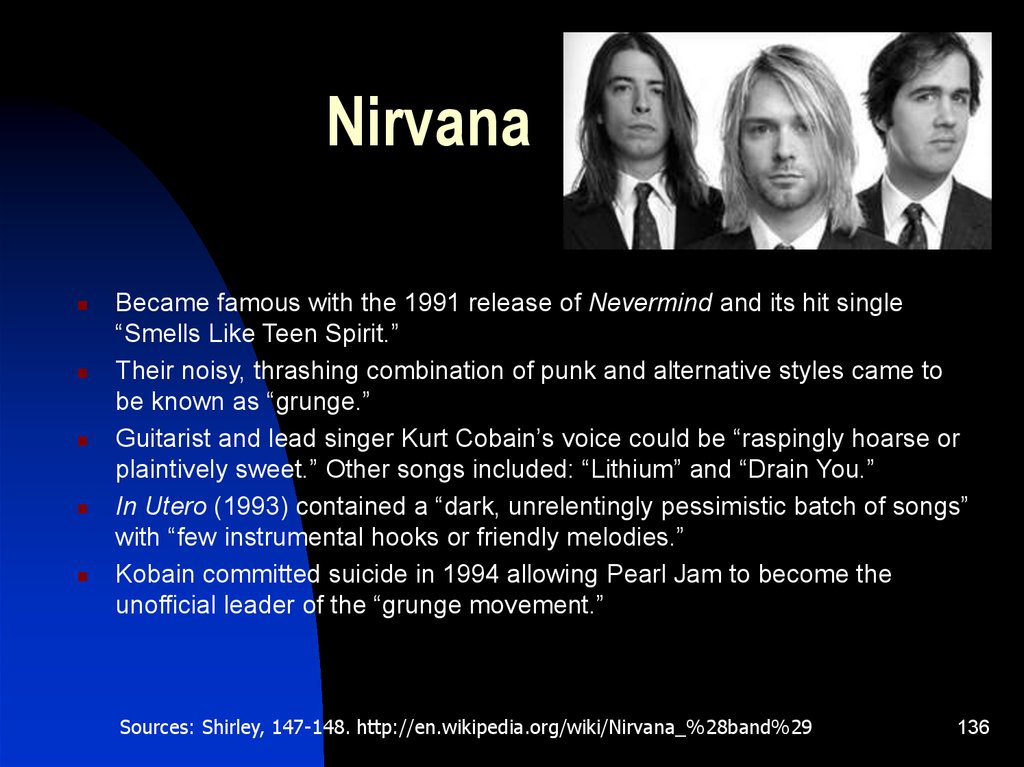
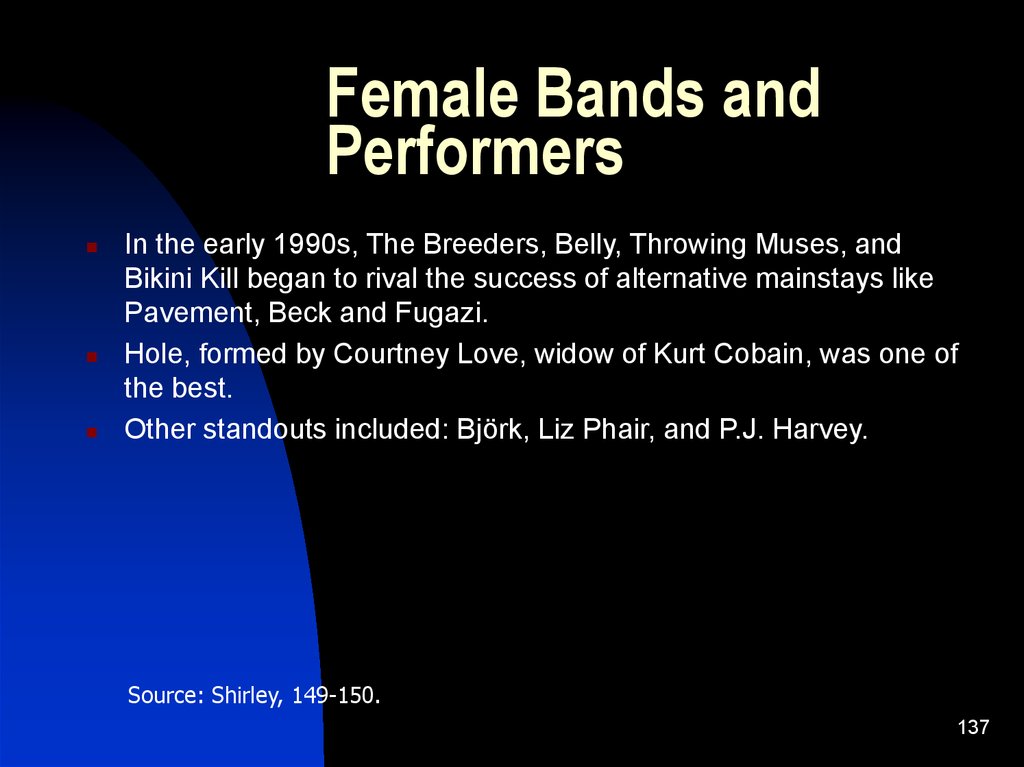
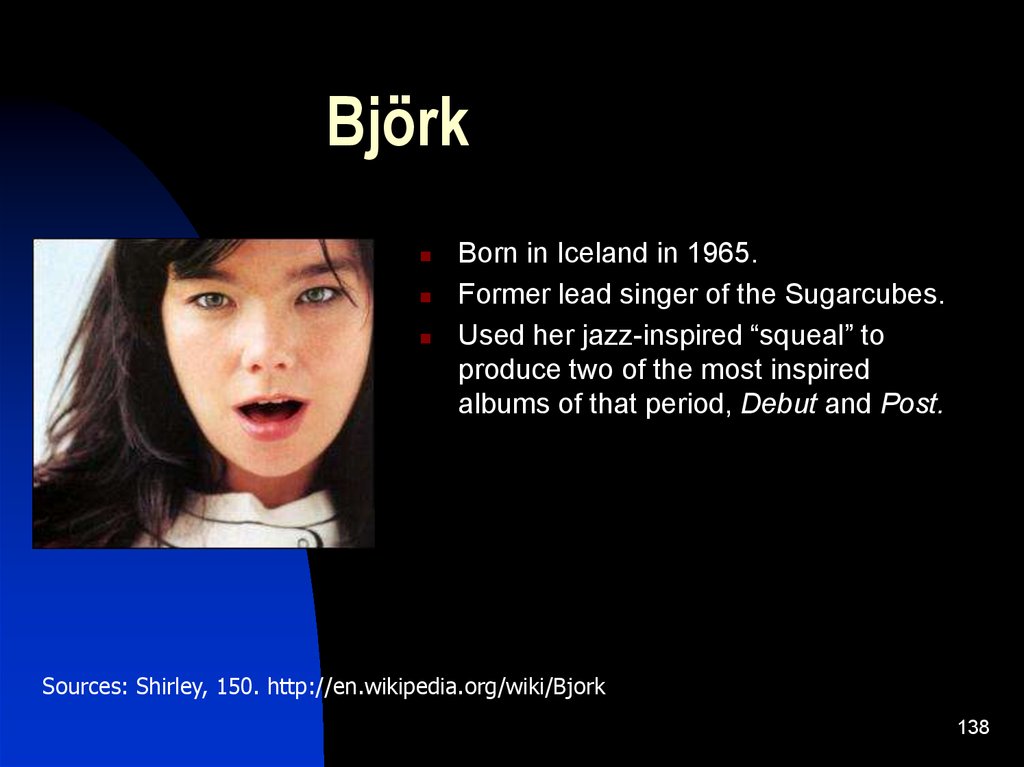
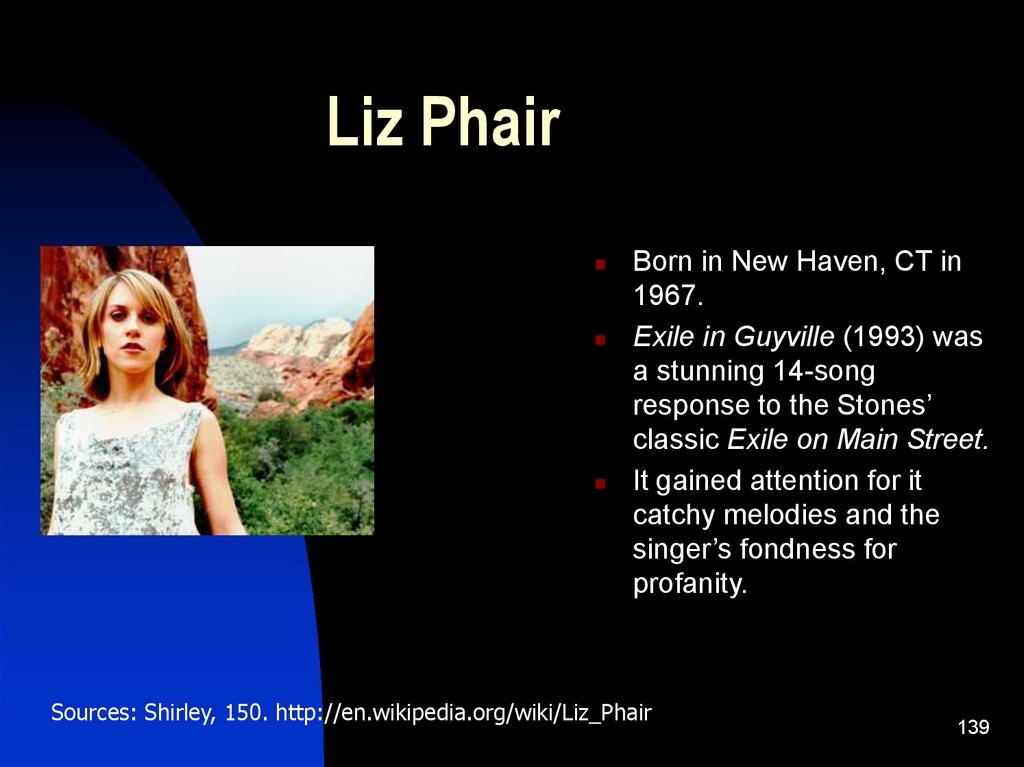
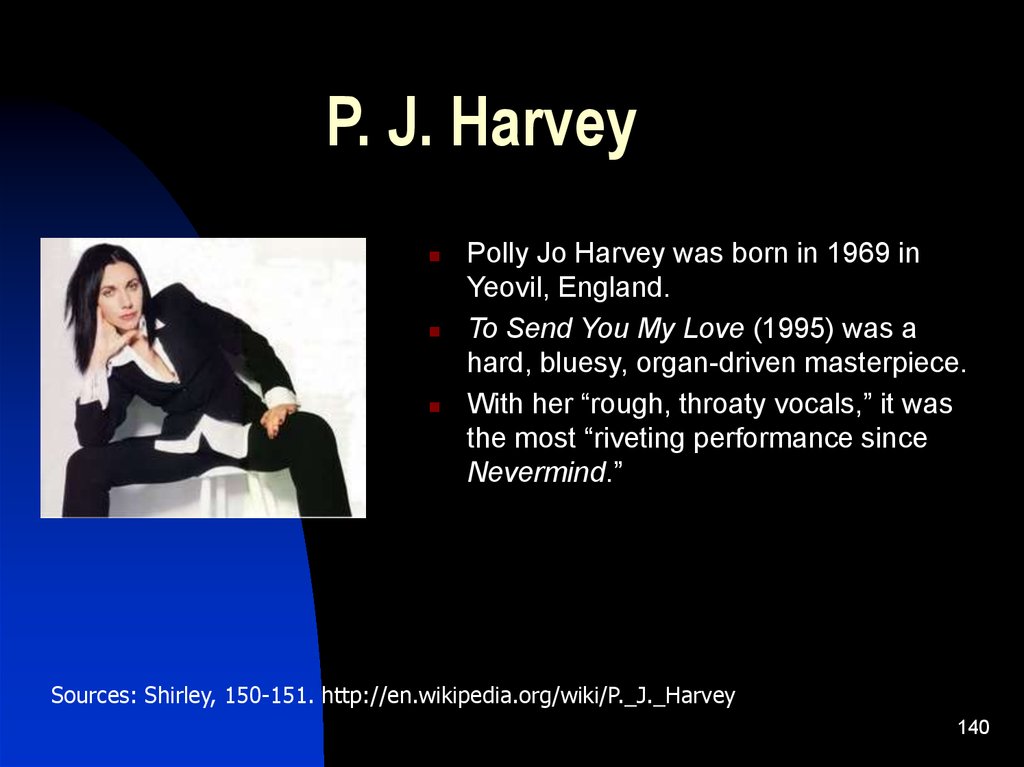
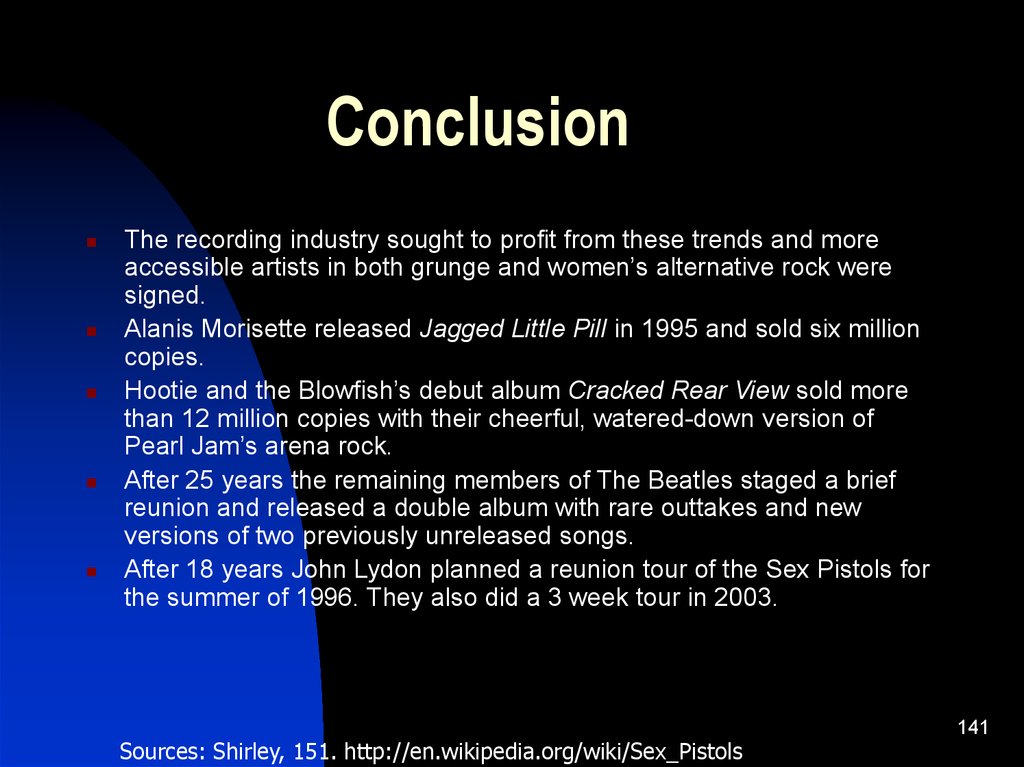
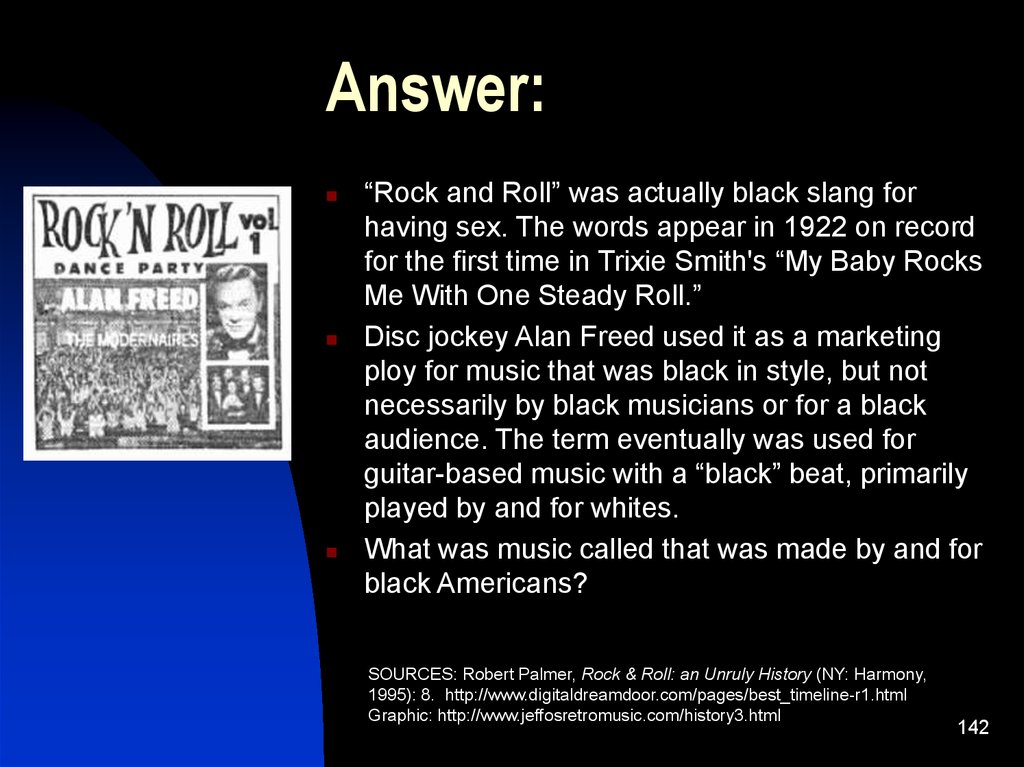

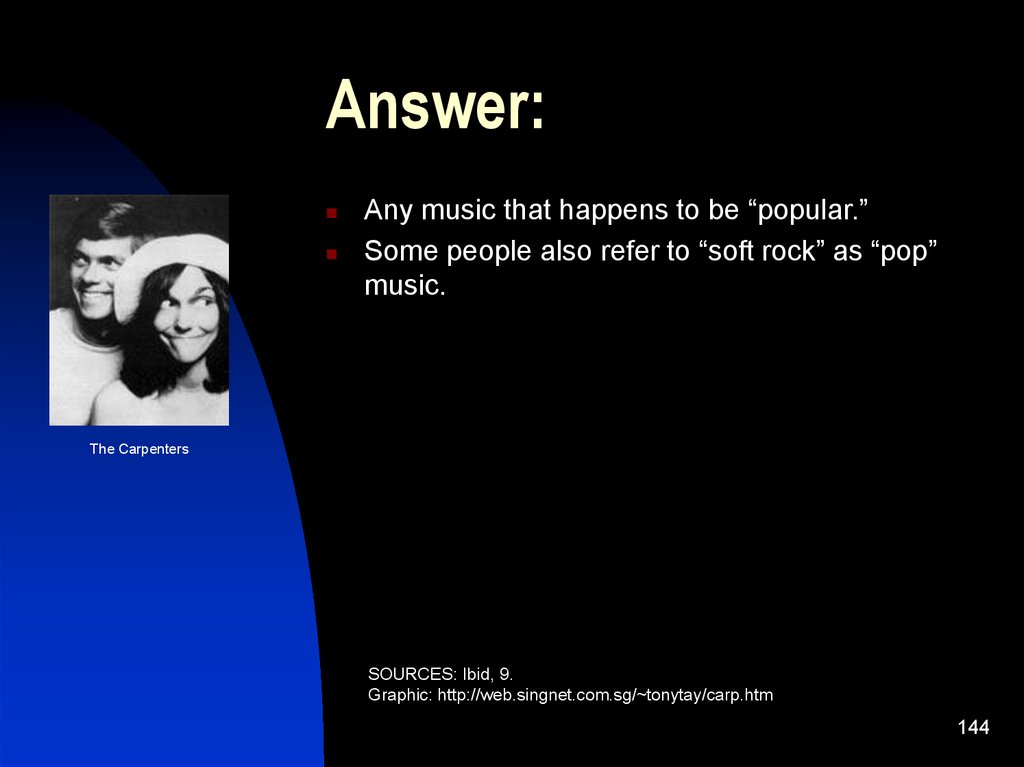
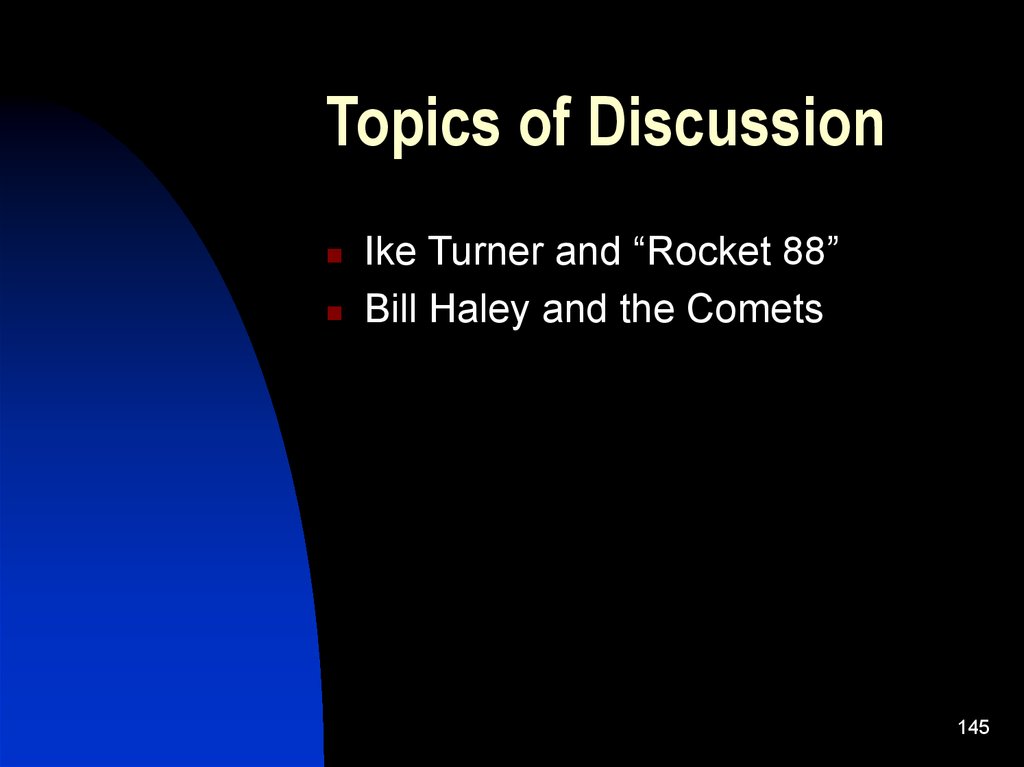
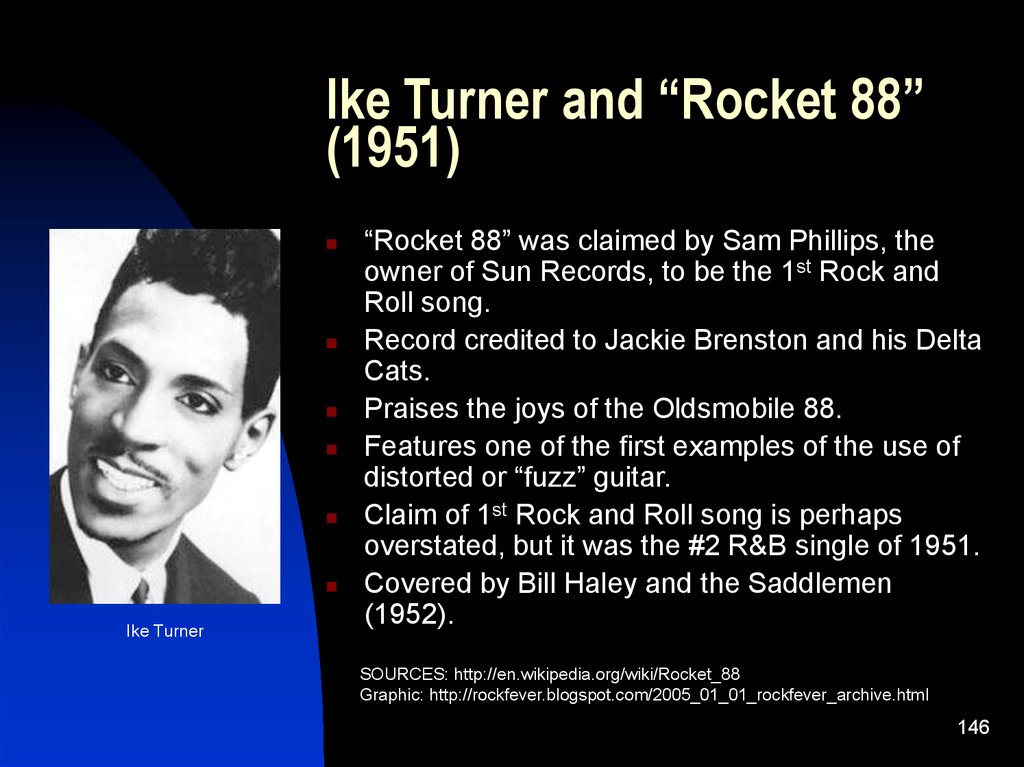
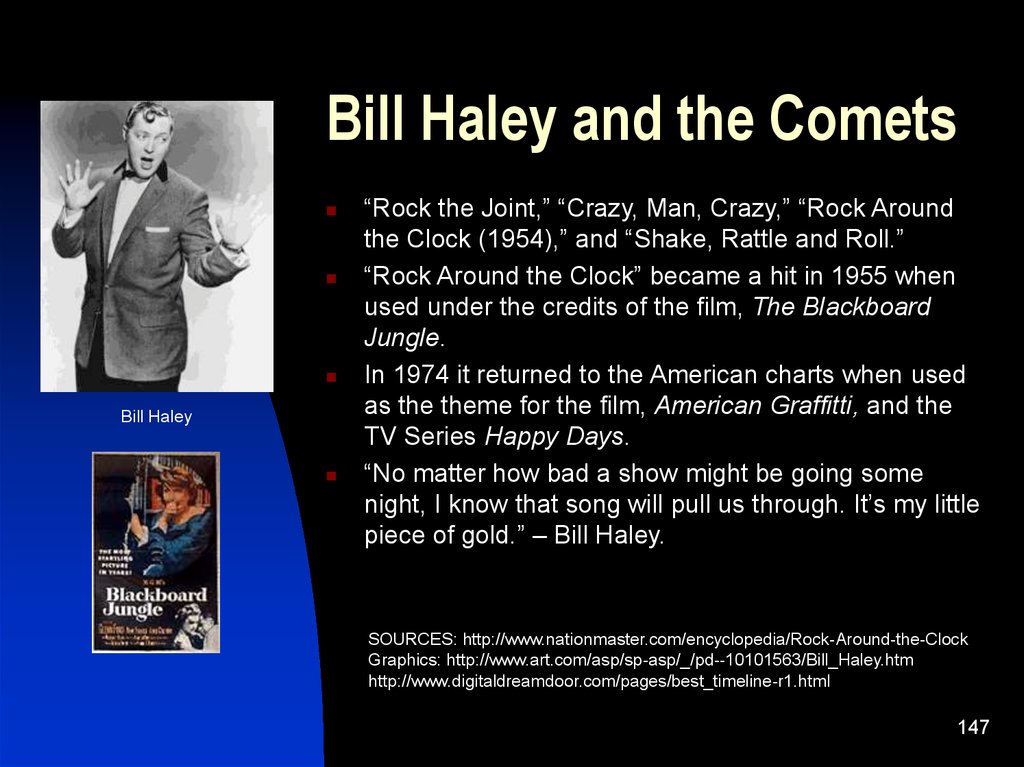
 Музыка
Музыка








